#Did I focus way to much on a story of dubious canon
Explore tagged Tumblr posts
Text
Now, I’m not sure if anyone in the TOA fandom has ever mentioned “Tongs A Lot, Dad”, a short story found in Camp Half-Blood confidential, but I strongly believe it adds (or perhaps reinforces) a lot when looked at with the additional context and characterisation the Trials of Apollo provides.
An almost diary entry like addition in the short book, the story is told by Connor Stoll, following him and his brother as they poke around the old attic where the Oracle of Delphi remained for decades in the interest of scoring loot. At this they are semi successful, as they are made almost ridiculously vital to the canon plot of HoO with the find of celestial bronze tongs, which are inscribed with the instructions “for plucking the Tartarus Napkin from fire”. And if you are reading this post, you probably have a pretty good idea of why that’s important.
Now, what does this have to do with Apollo? Well, I find it highly probable that this was Apollo’s doing, for multiple reasons.
1. The tongs were found in the oracle of Delphi's old abode, which is obviously Apollo’s domain, a place you would think he’d be very familiar with- the original place of the Oracle of Delphi was sacred ground, in fact, and even if that doesn’t quite translate to modern day... there is that theory about him being Camp Half Bloods Patron, pioneered by @tsarisfanfiction, I believe. Whatever hold the ancient laws have on the gods, I think we can somewhat assume that places such as these allow more wriggle room.
2. This notably happened basically simultaneously with Rachel becoming the Oracle, as seen here, “While everyone else was waiting to see if Rachel, the new Oracle, would survive....we made our move around to the back door of the Big House.” At this point, we’ve just wrapped up PJO. How would Apollo of known to set this up now? Well, we already know from Octavian in SoN that Apollo talked to him personally, and that their talk must of happened before Olympus closed, because he was stuck on Delos after. So if Apollo can put that into play, why not set up this? After all, Apollo is the god of prophecy - he could of understood it was needed. He obviously knew there was a threat.
3. In the books (before ToA) we only see Apollo in Camp Half Blood twice- once to take Percy’s group and the hunters there in TTC, and once at the end of PJO to, as Conner so delightfully puts it, wait to see if Rachel would survive the Oracle. He was right there. And if that’s not enough for you, the reason Conner picks out the bag with the tongs? A “beam of golden light, shot upward from the floor” startles him. We find out later in another story that Apollo is directly confirmed to have been the one to do this- gifting Rachel the famous tripod stool of the Oracle. It fits almost to well.
“But!” You might say, protesting, “The title confirms who did it! I mean, it’s not like Apollo is Connor Stoll’s dad!” And to that I say- although the title does suggest that Hermes is responsible, it’s never confirmed, and more importantly- it’s in Connor’s POV. Why shouldn’t he assume it’s his dad? And why would he know otherwise? Perhaps you could make another connection with Hermes due to his shrine in Tartarus and point at that as his involvement, but wouldn’t it make more sense if Apollo knew it was a Child of Hermes who had to have the tongs, and acted accordingly? Afterall, last we saw Hermes he had a significant grudge against Annabeth, and more importantly has done nothing to suggest he’s capable of such foresight, especially at this point.
Now that I have (hopefully) convinced you of Apollo’s involvement, another titular question must be answered- why does it matter? What’s the ramifications of this? Well, considering that this napkin basically ends the civil war between the Greeks and the Romans... a lot, actually. Specifically, it allows Annabeth to communicate that reconciliation can be reached if Reyna, a Roman, returns the Athena Parthenos, an important Greek statue to the Greeks. (Also interesting to note she addresses this to Rachel, Apollo’s Oracle... another subtle connection).
In ToA, Zeus punishes Apollo mainly for two stated reasons: Revealing the Prophecy to soon, which becomes pretty clear is not how prophecy works. And encouraging Octavian to declare war on the Greeks. But wait? If the Napkin succeeds due to Apollo, that means that he is trying to stop the war, which in my opinion follows more along with his characterisation in ToA. So what happened with Octavian? The fact of the matter is, people more clever then me have attempted to solve this question, such as @zazzander and @fearlessinger (Highly recommend this post if you are interested in the topic!)
The tongs (and thus the potential for the Napkin) was put into place months before any true threat would be realised by most characters. So it wasn’t a frantic backpedal of trying to fix his mistakes to avoid punishment by Apollo. It was deliberate. Premeditated. Now, it could be that Apollo just knew the tongs would be needed, but not what for. Unfortunately, we don’t know how his powers work. But that’s boring. However, if you take the view that Apollo’s communication with Octavian was part of a larger strategy to reunite the camps... (again, see the linked post). Well. Funny thing, because that’s exactly what the Napkin facilitates. The two camps stop fighting because of this one, simple message, and the effect it had. They focus on the true enemy. Gaia.
What does this tell us then about Apollo, then?
Well...not much new, surprisingly. ToA does it’s job well. We know Apollo cares, deeply, about his kids and demigods as a whole. We know he often acts subtly, through quiet actions that he’ll never admit to. It’s maybe the final piece of evidence you could point to and say definitively that Zeus’s punishment was unjust, but we already knew that (although funnily enough, Zeus doesn’t- and even if he did, he’d probably just point to the violation of the interference laws and punish Apollo anyway.) What it does is add on to a very firm characterisation that ToA finalises, and showcases how once again Apollo is so much more then he first appears.
#Did I focus way to much on a story of dubious canon?#Yes#Do I regret it?#No#Apollo meta#Apollo#ToA Apollo#Pjo Apollo#PJO#TOA#Trials of Apollo#lester papadopoulos#I have been meaning to do this for ages#I just think it's a really neat detail... but it just kept getting longer#Oh well#this meta is just me being insane for#roughly 1k words erbherf
226 notes
·
View notes
Note
I'd like Russingon so much more if people weren't annoying about it. Like, it's genuinely interesting as an epic friendship chivalric bond type relationship, and I like both characters, the dynamic between them and how it affects the text, but, to me that's so much more interesting than 'oh, of course we were secretly married the whole time, undeniable canon ship', like, it's so irritating and it lacks depth and also? They're not canon. I completely understand people who do want a major queer relationship, but. It's not canon. If anything, the relationship Tolkein maybe consciously wrote as intentionally homoerotic is Turin and Beleg. And at this point I'd genuinely be more interested in something that approaches Maedhros as Fingon as having a platonic relationship based around the chivalric narratives I'm pretty sure Tolkein was inspired by. And I hate the take that if you don't ship russingon you're automatically homophobic.
Also I'm so agreed on the Eol thing, like, yeah, that story has some pretty hideous racist subtext and I get people wanting to change it but idk why they always do it by a) making Aredhel 100% in love and happy with a man who refused to let her leave his house and who later killed her by trying to kill their son OR b) slutshames and villanises Aredhel, usually by portraying her as an abuser (sometimes having the gall to call it feminist and empowering like. If you think a woman being a rapist us empowering you need serious help) And I'm also not sure why she gets called the slutty cousin when one of the first things we know about her is 'she gave her hearts love to none', and when she did get married she was at least partially coerced into it? Like, aside from how horrible slut shaming random female characters is, Aredhel seems like the least likely candidate? She and Celegorm are always so mischaracterised, one thing I really hate about fandom is how it seems to have this set of archetypes it shoves characters into even if that's not how they are in text, to make them more palleatable and understandable I guess? Like, Celegorm was probably a bit on the wild side, but we know he's a linguist and an orator and a skilled commander who actually seems to have taken the initiative in the Nargothrond coup, like? He's always made into a dumb jock and Curufin's always so bitter and bitchy and neither of those seem particularly accurate to how they are in canon? (Also have to agree on the Celegorm/Curufin side, I've read some good fic)
I think one of the biggest problems in the Silm fandom is a) people whitewashing their faves and picking sides in a way that seems really unconscious of how the text emphasises that this is about complex people with incompatible goals and b) people always wanting their ships to be canon to the extent that they end up putting them as the focus of the story, and twisting the text to try and validate them which like? I like a fun ship as much as the next person, but something's aren't canon and that's literally fine? Like, I'm really into Melkor and Sauron as characters, and I do really enjoy Angbang as a ship, but the amount of people who claim they were 'literally married' when we don't have any textual indication for their relationship other than one-sided fanatical devotion on Sauron's part and a level of trust and respect on Morgoth's, is seriously annoying.
Sorry I've been ranting please feel free to ignore this
sorry for taking so long to respond, work was crazy today! but i completely agree with a lot of this, thanks for sharing!!
i think the question of whether or not there’s a “canon queer ship” in the silm is dubious for a bunch of reasons, but i totally agree, if anything it’s turleg! it just doesn’t make sense for tolkien to have explicitly condemned cousin marriages between elves but also to have intended russingon to be read romantically. of course, you don’t have to stick to tolkien’s intent in your hcs LOL- that’s why fanon exists- but his intent does shape what is canon and what isn’t, and he was writing and living in a different time. which is why the argument that anyone who doesn’t ship russingon is homophobic annoys me lol. and even if russingon WAS canon, it wouldn’t be homophobic not to ship it, that’s not how that works lol.
AGREED re: aredhel and eol! i am really not a fan of any analysis of them that somehow tries to spin it around so aredhel was the abusive one. of course, to each their own, but i don’t personally see anything progressive about that and also don’t feel it’s a compelling read of canon. the thing that i think some people don’t get about aredhel is that she can be the victim in an abusive relationship AND a strong woman and an important character beyond that abuse. those things can coexist, and they do. aredhel was groundbreaking! she (and galadriel, i think?) were the only women who survived the helcaraxe! aredhel was the only woman involved at alqualonde! she’s the only female hunter in tolkien’s works! she’s so much more than just some vessel for birthing maeglin and then dying, ugh. even though she didn’t survive the horrible situation she was put in with eol, doesn’t mean she was weak or irrelevant and also doesn’t mean that the only “progressive” interpretation of her needs to be that she was in the wrong somehow.
re: the idea that celegorm is dumb… YES! people forget that he’s canonically a great public speaker, and i think he might’ve had the best “people skills” out of his brothers- remember, he singlehandedly stirred everyone up for the second kinslaying (for better or for worse lol). and he knew more about the forest and about animals and nature than pretty much anyone else due to his training with orome, and the fact that he could understand/maybe speak to animals shows he had linguistic skills that went WAY beyond most other elves.
and curufin… one curufin moment that the fandom seems to collectively ignore, but that i LOVE and that seems really at odds with his characterization as a cunning scheming bitch, is the moment where he runs into eol in pursuit of aredhel and confronts him, telling him off for having forced her into marriage and basically telling him to get the heck out of himlad. he clearly cared a lot about his cousin! he clearly does have morals LOL!
10 notes
·
View notes
Note
Hi....Do you mind if I ask your top 10 favorite anime (can be series or movies) or top 10 favorite manga? And why do you love them? Also, what are your top 5 (or top 7) favorite moments from any anime (can be series or movies) or manga that you loved?
Sorry if I ask too much, feel free if you want to answer both of my questions or just pick either one......Thanks....
aaaahh no i'm so honored to be asked something like this!! these are REALLY hard questions tho LMAO like holy shit i STRUGGLED. i ended up choosing the series/moments that left me with the greatest emotional impact or were really formative during my younger years. this turned into a really long and wordy post so uhhh sorry about that, I would have added more pics but they couldn't all be the same size so i gave up LMAO. Anyways let's get into it!!
TOP 10 ANIMANGA SERIES/MOVIES (in no particular order)
I. HAIKYUU!!
I wouldn't be much of a Haikyuu!! fan if this wasn't number one on the list (even though I said they were in no particular order, haha). With how the anime adaptation is coming along, I do absolutely recommend reading the manga. Aside from the fact that the art is just gorgeous, I love how Furudate puts so much care into the characters and story. The symbolism and poetic one-liners that have no business being in a sports manga are fucking fantastic, the development is great, everyone gets a happy and fulfilling ending, and it all wraps up like an emotional sucker punch to the stomach. I also LOVE that there's so much canon material for fans to play around with, and that there's so much left to the imagination. Haikyuu!! really is just a master class in storytelling and a total dream to analyze.
II. THE NIGHT BEYOND THE TRICORNERED WINDOW
Okay, I lied earlier. I just HAD to put this one second. (I swear after this the order doesn't matter!) It has an anime series and live-action movie adaptation, which I haven't watched, but I've heard that they don't really do the manga justice. Now, I wouldn't really recommend this one to kids, which I guess can be pretty broad or specific based on your definition? Strictly speaking there aren't any NSFW explicit scenes - nobody even gets naked at any point nor is it the hated ecchi style with random underwear/breast shots or whatever - but the two main characters are pretty euphemistic in, say, the first quarter or so of the series.
(Hiyakawa borrows power from Mikado and when that happens the feelings mirror the pleasure of intercourse, to put it bluntly, but that's not something that actually ever happens. Mostly we, the audience, just see Mikado get red and flustered, although Hiyakawa says/does shit to go along with it sometimes. It gets milder -> nonexistent as the plot progresses because that's not really the focus of the story.
Also, if you're sensitive to dubious consent then this probably isn't for you, since a big part of Hiyakawa's arc is learning how to be less fucked-up than he is and he often uses Mikado's power while Mikado tells him to wait or slow down - not because he wants to hurt Mikado or make him suffer, but because Hiyakawa just genuinely doesn't know that it's the wrong thing to do due to his upbringing. I won't go into why for spoiler reasons, but it becomes really clear by the end of the story. For those of you who are willing to look, I'm going to show a couple pics of this in action down below - otherwise, please skip over it and just scroll down to the parenthesis.
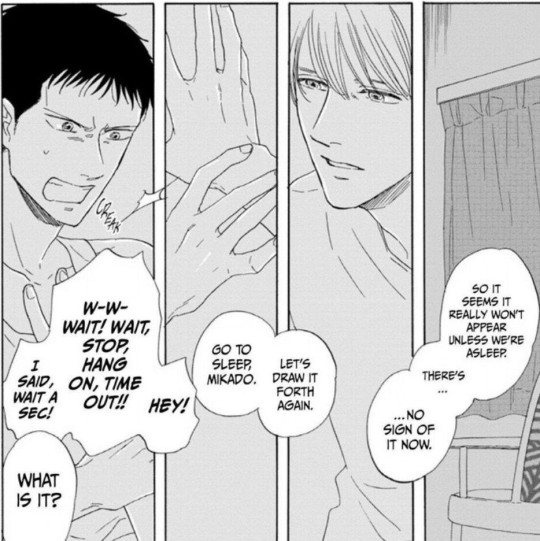

I wasn't really expecting to to go as in-depth as I did about this, and I do love this series, but I also want to give fair warning since the way the dialogue and Mikado's expressions are depicted give off a very real sense of urgency that I would hate for anyone to be caught off guard/be triggered by. I'd love to talk more about it if anyone wants to ask, but I've already diverged enough from the original question.
I don't want you thinking that they have an imbalanced toxic relationship in which Hiyakawa has all the power and Mikado is subservient to him, though, because that's not what it is either. Mikado has always been his own person, and Hiyakawa never tries to control him in any way besides from his own misunderstanding of consent. They help each other on equal grounds, but apparently the anime does a terrible job of showing that.
END )
So, why do I love this series? Well, it's modern paranormal/supernatural, which I'm a HUGE fan of. Apparently Gege Akutami (Jujutsu Kaisen author) named it as one of their own favorites, and once you read it you can really see a LOT of similarities. There's a character just like Okkotsu in that they've done REALLY shitty things and don't know whether they deserve to live or not. There's also a lot of learning how to be brave when you've been running scared your entire life and taking back your own control/power through it. And, other than the heavy stuff, it's actually quite funny. There was one moment I wasn't expecting where I actually laughed out loud.
Also, the characters are really compelling! Aside from everything I said about Hiyakawa earlier, he's one of those nonsensical types who says the most ridiculous things with the utmost sincerity and with a straight face. Mikado acts as his opposite - he easily freaks out and is very expressive. Also, the villain? Like holy SHIT. I could go on about them forever. Like. Holy fucking shit. Top-tier how they handled the boss battle because hoooolyyyyyy shiiiiiiit. But I don't want to spoil, so I'll leave it at that.
Also, the background stories for the characters - once you get to them - will break your heart. Yamashita draws really simply, sure, but they have such a powerful way with storytelling that the emotions just hit you like a brick through the window.
Mostly, though, it is a story about healing, and I'm a sucker when a bunch of people who need to heal in different ways because of the same thing all come together and help each other. I can also guarantee a happy ending, so look forward to that!
III. SNOW WHITE WITH THE RED HAIR
Oh, how I love this series. I know the anime hasn't adapted to its current point, so I def encourage you to read the manga even though it's not complete yet either (and I started in like middle school LMAO). Shirayuki was honestly such a huge role model for me growing up - she was smart and pretty and determined and, even when she wasn't so sure of herself, she always wanted to do the right thing. All the characters in the main squad are so lovely and feel like a real family altogether, and I adore every single one of them. It's sweet and romantic and nails nonmagical fantasy worlds right on the head, and I'd LOVE for more people to get on board with it.
(If you need more convincing, there's pirates and festivals and assassins and a character to love for every single person out there. I know Kiki and Mitsuhide are enough to cause a crisis.)
IV. BOYS RUN THE RIOT
OKAY Y'ALL. LISTEN UP. YOU WANT MORE LOUD AND PROUD QUEER REP IN MANGA?? HERE'S YOUR QUEER REP COME AND GET IT.
It doesn't have an anime adaptation so you can't really watch anything and be done with it, but there's only four volumes so it's easy to collect. it's a story about a transgender teenage boy named Ryo who expresses himself through fashion and GOD I love everything about this series. Jin is the BEST ally. It feels like such a warm hug to see something so proudly represented in manga. ALSO Boys Run the Riot started as a prototype one-shot that the author entered into a contest, and in THAT one of the first characters prototype-Ryo comes out to actually reveals to him that he's Korean!! He kept it hidden and changed his name to protect his identity!! Do you know how fucking REAL Keito Gaku was for that!! Like there is a whoooole conversation to be had about that topic but that is not for now!!
Anyways yes Boys Run the Riot makes you want to cheer and scream when everything comes together in the end because it felt like an uphill battle you were holding your breath through the entire time and I LOVE that they get a hopeful ending. Give it a try, I'm BEGGING.
V. CARDCAPTOR SAKURA
Okay, I'm going to be honest: this is pretty much the only series that has a manga AND an anime in which I've only ever seen the anime. I hear it does a pretty good job of adapting, though, so I'm not too concerned about it. (I do plan on reading the manga to catch up to the Clear Card arc.) I'll also admit upfront that since CCS is a kids' series, there were quite a few problems in it that I didn't realize until I was much older and went back to it.
I like that Sakura feels like a very real protagonist. She was scared and wimpy quite often, and as a kid it was really empowering to watch her develop into someone confident of herself and her abilities. She's got such a great supporting crew behind her, too! I especially loved that CLAMP brought in Syaoran and Meilin from Hong Kong - even nowadays, a lot of non-Japanese foreigner animanga characters fall into the American or European category.
Also, Yuki and Touya. Just do it for them. Seriously. You can watch CCS for them and ignore everything else.
Mostly CCS, for me, was fun and magical and a great escape for a little kid who wanted to get lost in a world not too far from their own. Also, it's got that 90s-drawn aesthetic we all know and love.
VI. PLAY IT COOL, GUYS!
Honestly, I love all of Kokone Nata's works so far. She's one of the more modern authors who got picked up on Pixiv, and I'm really looking forward to seeing where she's going. Play It Cool, Guys! is one of my favorites. It's actually a manga in color, and Kokone Nata utilizes it beautifully. She has so many fun characters and makes normal, everyday life seem so bright and fun. And not to sound like a main character, but I'm also a very clumsy, accident-prone person, so it's really nice to be able to see the crew do everything that I do and do their best to overcome them.
I also love how naturally their relationships develop. Like, seriously - how would a high school kid, two entirely separate and totally opposite college students, a late-20s office employee, and a semi-famous author all fall in together?? Everything is up to fate but Kokone Nata has a way of never making it feel forced. It's not at all unreasonable to bump into each other at the bookstore or in the park - especially when we see that they actually DO interact as strangers first who all happen to hang out/live near each other, and they just drift closer when they finally recognize each other. It's so subtle but so amazing to watch in action.
Also, it's very soothing and fluffy and healing and you absolutely do not have to put the amount of analysis I do into it LMAO, so if you ever need a pick-me-up I absolutely encourage this series or any of Kokone Nata's works!
VII. POKÉMON
Yeah, yeah I know. But I couldn't not include another childhood fave!! It was one of the very first I watched and Ash is honestly such a great protagonist and role model for younger kids. Sure, he can be an annoying brat in the ten-year-old way, but he takes losing like a champ and he always tries to do what's right. He was incredibly selfless, kind, and considerate for a character of that age and growing up alongside that really taught me a lot about what I wanted to put out into the world. Watching any episode just makes me feel comforted and like I'm paying an old friend a visit and it will always be in my favorites list. Plus the dub actually has some HILARIOUS lines LMAO.
Also, the Special Adventures manga series by Hidenori Kusaka is a total gem and was my first introduction to fandom, so if you're a Pokémon fan who hasn't read it then I really encourage you to check it out!
(I would like to make a note that I got stuck after this and was kind of fishing around in my head for the last three LMAO)
VII. HIBI CHOUCHOU
This one is one of my favorite high school romance series - it's sweet and fluffy and might be a little cheesy, but the characters are all so lovely and you can't help but want to cheer them on! The plot is kind of ridiculous when you first start it - "all guys instantly fall in love with the super pretty MC who hates the attention and has been declared 'unattainable' because of her distant attitude towards them and ends up falling for the one guy who didn't act crazy-in-love with her from the start" - but it's really heartwarming to see the growth Suiren and Taichi go through. I also really love Taichi because he feels so different and refreshing from a lot of high school romance manga male lead/love interests that I've seen. (Maybe because of the glasses? I can't name any other male lead/love interest with glasses LMAO.) It's such a gentle series and feels like a warm hug, and watching two quiet people find their way together really did wonders for shy high school me.
IX. FADED FIRST LOVE
Oh gosh, this one is SUCH a gem! You know how sometimes people want representation as a sweet story that's not about an identity crisis but just having fun and in love? That's what Faded First Love feels like. It's genuinely funny and sweet, and while Aoki DOES encounter a couple homophobic problems here and there, it's mostly lighthearted and nothing he can't handle with the help of his friends. He and Iida are both learning and doing their best, and it's one of the series I go back to whenever I want a pick-me-up.
X. JUJUTSU KAISEN
I did say before that I was a huge fan of mixing paranormal phenomena with modern settings, and Jujutsu Kaisen is a great example of that. It's crazy how much thought was put into the technical aspects of that world - every time I think about Gojo explaining to Itadori how to channel cursed energy, it makes my head hurt. The monster designs are so creative and the characters are all such a great bunch. I tear up whenever I remember Miwa listening to Mechamaru's voice recording on the plane. What really nailed it as a Top 10 for me was JJK Volume 0, because hooolyyy shiiiit. Okkotsu's growth was FANTASTIC to watch and I LOVE how confident he is now and how he follows the philosophy of "the people I care about care about you" when it comes to Itadori.
So that's it!! God, that was hard. I hope you enjoyed, and for anyone else reading it I hope this encourages you to pick up one or the other!!
Honorary mentions to: Promare, Kimi ni Todoke, From Up on Poppy Hill, Our Not-So-Lonely Planet Travel Guide, Gekkan Shoujo Nozaki-kun, and tbh I'd list more but that would take forever LMAO
This is already a really long post so I'll reblog or make a part two with my fave moments, I'll let you know!
thanks all <333
#JKDBLUIFHAUFAWF THIS WAS SO LONG OH MY GOD I'M SO SORRY#THIS IS THE LONGEST POST I HAVE LMFAO#haikyuu!!#sankaku mado no sotogawa wa yoru#the night beyond the tricornered window#akagami no shirayukihime#snow white with the red hair#boys run the riot#cardcaptor sakura#play it cool guys#cool doji danshi#pokemon#hibi chouchou#kieta hatsukoi#faded first love#jujutsu kaisen#sou says stuff#sou answers
15 notes
·
View notes
Text
At this point I feel like I can’t join most fandoms because I don’t care at all about the stuff that drives 99% of the fandom wild and then I focus on stuff nobody wants to think about but also on very specific ways so people are like “Why are you setting these restrictions” and I gotta be like “IT DOESN’T MAKE SENSE OTHERWISE” Yeah like I KNOW I can go beyond season 1 for Scooby Doo (1969) and Inspector Gadget (1983) but they aren’t the same also also every different iteration ruins the immersion of having a singular world with a singular timeline. Or like, take Steven Universe. Everything in terms of twists were planned from the beginning so Frybo and the lighthouse-lars gem and the burned piece of paper with ink made of crushed gems and the moon goddess statue ALL have to be canon. They reference it even in future because how could you retcon it when you knew what you were doing already? Yet still… It doesn’t all come together. People say details go unexplained because it was just an art choice or the show hadn’t figured itself out yet. But the background art did have significant foreshadowing in it, and the show knew where it was going, so it’s still canon. Otherwise… why? OR THE SIMPSONS. TheRealJims’ 3-part video series on the Simpsons timeline helped TREMENDOUSLY, but still I have to assemble a singular, definitive timeline from which all my headcanons and theories stem otherwise they make no sense! I had to make a whole AU with @simpsonssitcom to make a linear Simpsons story! And I do it because I love all of these shows so much and I could fall into the worlds but then the worlds fall in on themselves and crush me underfoot. Things like Rick & Morty or The Stanley Parable are so cathartic for me because they’re blatant from the beginning about how, despite having emotional moments, the actual reality of the situation is canonically dubious in any given moment. The reality of the world IS unreality, so I can accept it easier, you know? (Ironic that those two properties overlap in my mind considering how the creators have collaborated)
11 notes
·
View notes
Text
Update on current projects/Schedule for the rest of 2022
I thought about doing something like this for a while so here it is. I have no overview over who follows me for what reason but I assume most of my followers (much like my ao3 user subs) are in it for the Naruto stuff so this will probably clear up once and for all that I don't do that anymore.
There are no dates for any of these because I write when I can/want and have no actual schedule whatsoever BUT the order in which they're listed will most likely be the order in which they're posted, so there's that.
begin again - a 'The Other Woman' style Warcraft Tyrande/f!OC-centric collection of short scenes exploring the consequences of Malfurion's 10k years slumber, ft. some of lore/worldbuilding from my dormant Highborne project
Garden of Eden - the second and final chapter
Divine Anthology (working title) Part I: Persephone (til the fall) - a series of short stories set during modern times focusing on select Greek goddesses and their relationship with a different (female) mortal each. Only one gets explicitly sexual and it's not the most obvious one of the lot.
The Origin of Lara - a Tomb Raider Lara Croft/Jacqueline Natla oneshot that's essentially the weirdest but also best love story I have ever written
Elysia - an Elden Ring Queen Marika-centric post-canon AU oneshot exploring a 'what-if' type of scenario that not only gives her a (in my opinion) more satisfying ending but also may or may not connect Elden Ring to the Souls series in probably the most unexpected way possible
weave me into being - a retelling of Arachne's poem making the whole tragedy slightly less tragic, much more dubious, and really rather gay
Divine Anthology Part II: Hera (something worth taking)
Divine Anthology Part III: Aphrodite (where gods go to die)
Divine Anthology Part IV: Hestia
Divine Anthology Part V: Artemis
Anathema - the final three chapters, finishing what I started
Looking at this, I think Anathema won't actually be touched again this year so that story's taking a one-year hiatus. I can't focus on a longer project when I have too many small ideas plaguing my thoughts so I'm getting those out of the way first.
And that's it. I don't think I forgot anything but if I did, well, it's going to show up on my ao3 profile eventually.
#ao3 fanfic#fanfiction#lara croft#vampire the masquerade#warcraft#tyrande whisperwind#greek mythology#persephone#queen marika#arachne#athena#hera#aphrodite#hestia#artemis#tomb raider#meredith stannard#female hawke#eden corliss#femslash#elden ring
5 notes
·
View notes
Text
Belated Spring 2020 Anime Overview: My Next Life as Villainess
For the Spring 2020 anime season, I mostly watched continuations of shows I was already into. The one new show I did pick up was My Next Life as a Villainess: All Routes Lead to Doom!
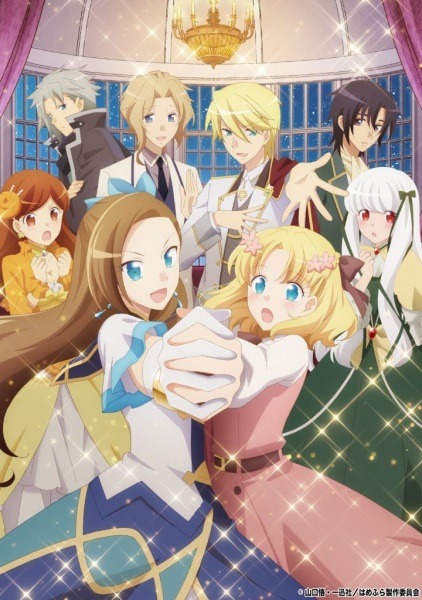
My Next Life as a Villainess: All Routes Lead to Doom! follows Katerina Claes, a spoiled young noble girl deviously scheming to win the heart of a prince- oh wait, never mind, she hit her head and remembered her past life! Turns out she’s an eighteen year old Japanese otaku chick who died and got reincarnated as the villainess in her favorite otome game.
If you don’t feel like reading the wiki article, an otome game is basically a female- targeted dating sim where you play as a blank slate main character and date a bunch of pretty boys (and sometimes girls, but usually only if you go outside the mainstream ones), unlocking their backstories and collecting all the romantic endings.
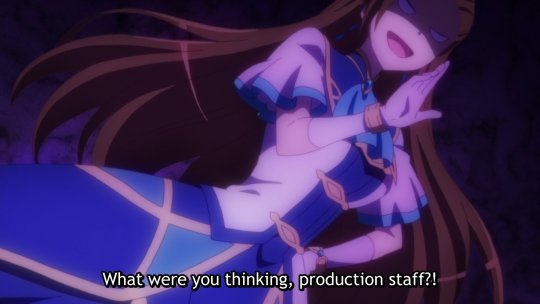
Having played this game, Katarina is well aware that the Villainess character- who constantly tries to interfere with the game’s heroine and whichever boy she’s pursuing- is either exiled or killed in all of the games endings. And now she IS that villainess, living in the world of the game and all its characters! Does that mean she’s doomed to a horrible fate? What’s a girl to do?
Well, if you’re Katarina, what you do is be supportive and kind to the people around you and in doing so accidentally get every single character in the game to fall in love with you. And yes, this includes all the boys the heroine is supposed to date, the other female romantic rivals the heroine is faced with and the game’s heroine herself.
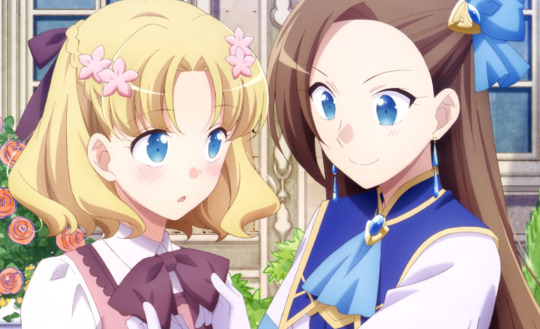
That’s right, we finally got us some bisexual romantic comedy hijinx last anime season, my friends! My Next Life as a Villainess was the delightful little show I really escaped into during these anxious pandemic times . All these girls casually falling in love with Katarina without it being treated as ‘weird’ was what particularly drew me to this show and warmed my gay little heart to see. It was honestly the perfect fluffy, low stress watch during these high stress times.
Anime has long been oversaturated with ‘harem’ stories- where a usually unwitting protagonist somehow gets a bevy of beauties in love with them- but it’s still unfortunately really unusual to see bisexual harems, especially ones with a girl at the center, so right away there’s a big draw to this story that helps it stick out from the rest. (And worry not, the story is largely focused on Katarina having fun with these pals-who-are-not-so-secretly-in-love-with-her, rather than having a ton the dubious shenanigans you see in more sexually charged tales.)
Harem protoganists also famously tend to have the personality of potatoes, being so painfully bland it’s unclear why so many people would fall in love with them in the first place. But that definitely not the case for Katarina. She’s brash, ridiculous, kind and INCREDIBLY dense, and that for a pretty dynamic combination in this setting! She does genuinely come off as a fun person to be around. Unlike a lot of modern isekai shows, she doesn’t stumble into having incredible magic powers or skills, so her compassion is genuinely her greatest strength and what saves the day and wins hearts time and time again.
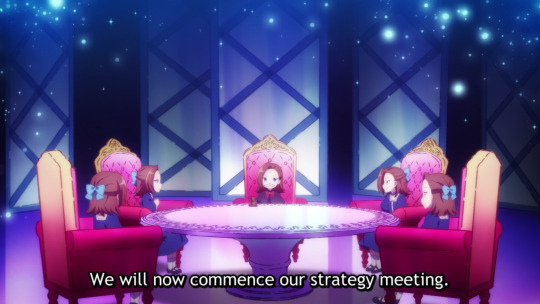
Katarina’s five brain cells doing their weekly check-in
(The moment she won my heart was when she responded to a tragic Frozen style situation with her friend locking himself away from people because he believed his magic was dangerous by taking an axe to his door. My kinda girl!)
The premise also allows for some plausible built-in reasons for the characters to take such special notice of Katarina- having been raised in a different world, she isn’t beholden to all the social rules, class divisions and noble family drama all the other kids in this very specific midevial-esque fantasy world are so embroiled in. This combined with her naturally earnest, accepting and straightfoward nature means she’s able to cross boundaries and reach out to them in a way they aren’t accustomed to. She was significant in each character’s life because she genuinely was the first to show them acceptance and affection without pretense, if only because she isn’t even aware there was supposed to be a pretense.
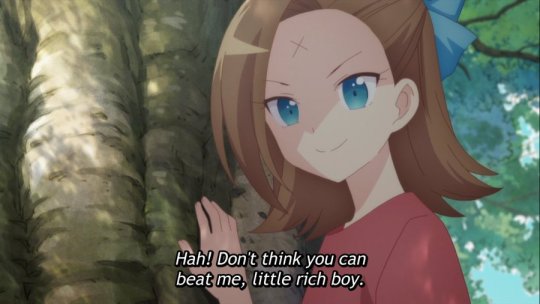
Katarina’s focus on trying not to die and her fear she’s going to meet the same fate as the villainess in the game also at least gives some kind of a basis to her comical obliviousness to everyone being in love with her. She assumes that everyone has to be into Maria (the heroine) and terrified of her because that’s how the game GOES okay, that’s CANON! Of course, this logic stretches thin as time goes on and it would be abundantly clear to most people that things have diverged greatly from the game’s storyline, but the show makes it clear that Katarina’s determined, one track mind is as much a gift as a curse.
Her bullheadedness when it comes to picking up how everyone REALLY feels about her is an intentional gag on the show’s part and even her love interests are well aware of what a colossal dumbass she is and not afraid to point it out!
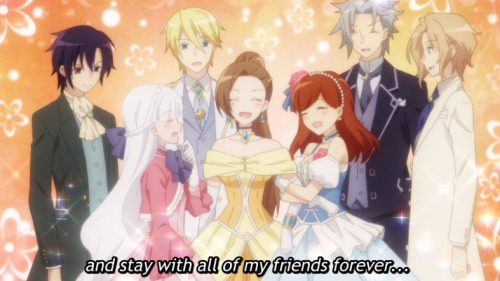
My Next Life as a Villainess isn’t without its flaws, and the personalities/backstories of some of the ‘love interests’ Katarina gathers may be a stumbling block on some- mostly the male ones. Geordo, “the black hearted prince” has a bit of the “ possessive shoujo bad boy” archetype about him, and though he’s far from the worst that genre of love interest has to offer (there’s not much bad he can get up to due to Katarina’s obliviousness, the lighthearted nature of the show, and his rivals constantly getting in his way), the way he refuses to break Katarina and his engagement off despite her repeatedly asking him to, as well as some of his lines here and there, are definitely NOT cute.
Keith is Katarina’s adopted brother, but clearly has a thing for her too. On one hand, they only first met when they were nine and he fell for her pretty immediately. On the other hand, he still refers to her as “sister” constantly which is kinda eesh.
The other two guys are all right- Nicol’s big thing is he’s inexpressive and doesn’t talk much which, considering show doesn’t spend much time inside his head, doesn’t make him a very interesting character in the ensemble (maybe he comes across better in the novels) but there’s nothing wrong with him. Alan is undoubtedly the Best Boy in my book. He’s another common trope- rambunctious and competitive with Katarina but clearly soft for her- but he’s done well and they have a lot of cute moments together.
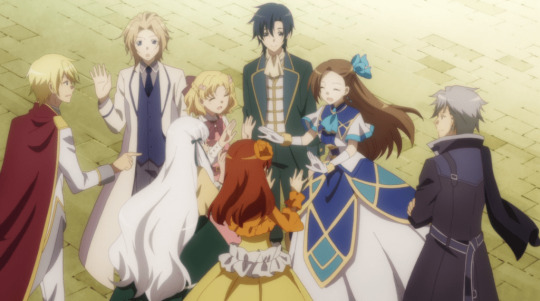
I find the girl love interests to be a much more interesting group overall, though this may be my obvious bias talking. Sophia has the strongest connection to Katarina, their backstories being intertwined in a surprising and touching way (I’m told in the novels her affection for Katarina was treated as more platonic, but the anime definitely plays it up as having romantic elements). Maria’s original role as the game’s heroine puts her in the most interesting position (and would make her the most narratively satisfying choice of love interest, if the show was actually interested in choosing). And while Mary is comically tenacious in her pursuit of Katarina, she’s doesn’t ever act ‘sinister’ or overstep boundaries in the way Geordo does, her “scheming” only really amounting to straightforwardly asking if Katarina wants to ditch her fiance and run away with her.
As I mentioned, one thing that really contributes to My Next Life as a Villainess being a relaxing watch is that the queer characters are treated with casual acceptance. Mary in particular isn’t subtle about her crush on Katarina, but nobody bats an eye at her and she’s completely open and comfortable with herself too. The observing maid notes that the girls are in love with Katarina with the same bland affect as when she notes she notes the guys are. And while the social practices of the nobles are pretty heteronormative- girls are always engaged in arranged marriages to guys, the guys are expected to dance with the girls (something Mary complains about!)- there’s apparently a booming queer romance novel industry that inspires our young wlw.
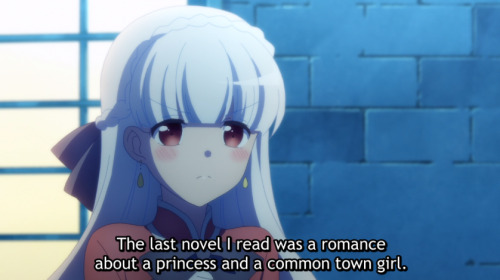
Katarina, having grown up in a different world, seems to be the one most prone to heteronormativity of her group. She never really considers that a girl would ever fall in love with her, but is also never hostile to the idea. It’s telling that when Mary very clearly indicates her desired romantic partner would be a girl, Katarina’s the only one that gets tripped up and has to walk back her assumption that Mary would be talking about a guy.
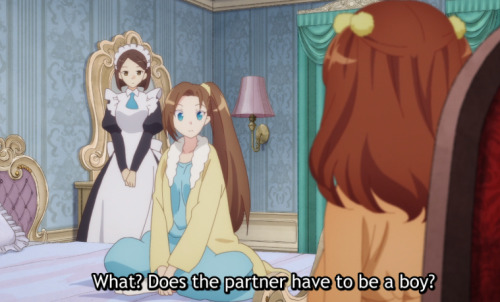
Mary LAYING DOWN THE LAW
Also, Katarina has SEVERAL “she’s so cute! My heart is beating faster!” moments with the other girls, on par in frequency with her moments with the guys. This strongly hints she’s an oblivious bisexual disaster.
So, My Next Life as Villainess is a fun, frothy watch and the rare positive example of silly wish-fufillment that’s inclusive to a wlw audience. But is the actual plot good, or remotely complex? The answer to that is no, the plot is fairly predictable and one definitely shouldn’t got into this story expecting a deep examination of the nature of fate or anything like that.There’s no real explanation of big reason as to why why Katarina was reborn into this game world and so on.
The antagonist that does eventually emerge plays off otome game tropes a bit, but ultimately isn’t that interesting or built up all that well. . The attempts at drama the show makes towards the end fall a little flat, especially since it tends to rely on very-late-in-the-game-exposition-dumps (dark magic isn’t even MENTIONED as existing in this world until like, the second to last episode where it becomes relevant and we get a vague infodump explaining its mechanics). The conflict honestly almost feels shoehorned in and the climax is pretty standard and doesn’t really utilize the big cast of characters all that well
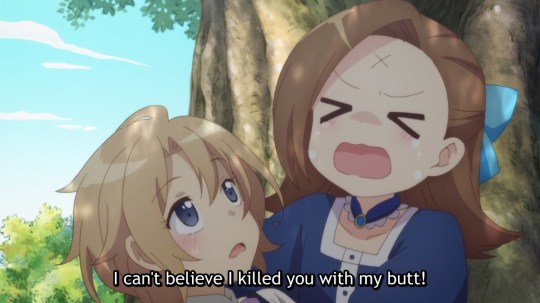
But in the end, that’s okay! The show makes it abundantly clear from the beginning it’s not here to be Deep, but to be some silly fun. And it really fulfills that purpose well, from it’s catchy, peppy theme tune to its consistently warm tone. It MAY get repetitive at times for some, and I do have some quibbles- like how I found the childhood segments to be some of the shows best material and wish we could have stayed in that section for a bit instead of rushing through it, how I wish Katarina had kept her cute little scar, etc- but overall, it was definitely the soothing balm I needed during a very rough time and I absolutely recommend it if you’re looking for a chill, feel-good watch.
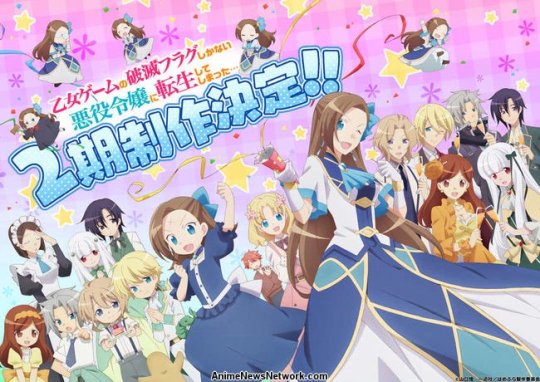
And hey, a second season’s supposed to be on the way too, so there’s something to potentially look forward to!
#my next life as a villainess#my next life as a villianess all routes lead to doom#destruction flag otome#otome gemu no hametsu furagu shika nai akuyaku reijo ni tensei shiteshimatta#anime overview#katarina claes#catarina claes#my reviews#spring 2020 anime
367 notes
·
View notes
Text
on aurora
aurora! she’s 1. the love of my life 2. incredible i care her and finally 3. all her lore is a mess. recently, i’ve been bothered by the lack of aurora-centric fics- there’s a few, but they’re all nastyaurora- but i’ve realized that’s not really a fault of the fandom! aurora is difficult to write and hard to learn things about! so, i’ve decided to make this meta on her!
it has two sections; history, which is more lore-focused red stringing, and characterization, which gathers some of her canon thoughts and reactions on things in an attempt to help people write her.
a large amount of this is based on things maki has said on the discord, which are both partially secret and of dubious canonicity, so please keep that in mind! (and assume that when a source is not cited, that is the reason).
in addition, i have written the aurora’s wiki page, which includes a list of physical features! this is helpful for anything set onboard.
history
terra
aurora was born as a moon! moons being weaponized is apparently a thing that happens, so that’s likely how she’s a ship now, but the physics of all this are very strange. she seems to have grown up in the same way as a human, meeting carmilla as a baby and jonny and nastya when she was older. importantly, she was sentient as a moon, and this is before she had any sort of programmed ai! she wasn’t capable of speaking at that point, but that may have just been because of her very young age.
aurora and dr carmilla have known each other for a very long time. extrapolating from things maki has said, we can assume that aurora was a moon of terra, carmilla’s home planet. maki has implied in the discord that 1. terra used to have two moons and 2. carmilla blew the other one up; that, combined with ‘i raised an orphan’ and a few other messages, could suggest that carmilla did the moon equivalent of killing aurora’s parent. perhaps because of this, carmilla took it upon herself to raise aurora. however, aurora is not a mechanism. as a alternative theory (though not a mutually exclusive one) there are a few messages about carmilla ‘creating life’ in discussions of aurora; we know carmilla didn’t assist with aurora’s birth, but it’s possible, as they are moons, that rather than already being there aurora was created from one of the fragments of the moon carmilla destroyed.
cyberia
we don’t know what happened between aurora and carmilla that made them separate, or how aurora ended up in cyberia; however, we know quite a lot about what happened there.
a large amount of it can be found in the fiction ‘the ghost in the machine’. the first thing there that i will address is that aurora’s sentience was actively inhibited rather than increased by her programming. as noted above, we know she was sentient as a moon, and the fiction repeatedly pushed that cyberia did not have fully fledged artificial intelligences, or if they did did not treat them as people. she is also said to have ‘hard-coded inorganic response patterns‘ coded into her, which are likely things similar to the toy soldier’s compulsion to follow orders. needless to say, that was most likely not a good situation for her to be in. it’s difficult to speak on this without getting too far into my headcanons, but my thoughts are that she was very dehumanized, most likely turned into a warship against her will, and the one person who cared a small bit more about her only did so as a project/experiment, which is equally as bad.
speaking of which, let’s discuss that! we meet aurora’s programmer, specialist 278 tereshkova, in ghost in the machine, where her distress call serves as the titular ghost. (i’m not going to summarize the actual fiction- it’s 1152 words and quite well written, if you want to read it!) the one direct line we have about her relationship with aurora is this- ‘[Aurora’s] software engineers never needed art either, although Specialist 278 Tereshkova thought of programming like lacework.‘, which suggests that 1. tereshkova had a bit more focus/care on aurora specifically but 2. still viewed her in a dehumanizing lens and likely contributed to aurora’s suffering. this is supported by the fact that aurora did not talk about her or attempt to help her when she was dying on the ship.
we actually have a large amount of information about who tereshkova was as a person! this is because she coded the mechanisms’ blog, (as in specifically, the wordpress one with posts archived on their website) and in a way that makes her personality show. well, what is her personality, you may ask? ...incredibly passive-aggressive and annoying. it’s so funny i love it. (’tales of the blogbot’) (sample blog post). we know the mechs are able to reprogram it, though with difficulty (1 / 2), and nastya actually mentions communicating with it (x), which goes unaddressed.
joining the mechanisms
moving on: when jonny and carmilla go to cyberia, carmilla tasks him with stealing aurora. (’how the aurora was won’). this could be because carmilla recognizes aurora; in fact, getting her back could have been the entire reason why they went to cyberia in the first place, with nastya being a bonus.
the aurora is most likely based upon the historical ship of the same name. (wikipedia). said ship fired the first shot of the october revolution, signalling the assault on the winter palace. this is the revolution nastya died in (both historical anastasia and mechs nastya, though i’m referring to the latter here). this suggests, because jonny stole her from the cyberian navy rather than revolutionists, that jonny and/or carmilla decided to fight in the revolution. this ties in with the theory that carmilla was purposefully sabotaging the mechanisms’ past lives (i have not written on this and do not plan to, but it’s a fairly common one) or it could also be viewed as several other things, including them just finding it a fun idea. this is contradicted by ghost in the machine, in which tereshkova says that an already supposed-to-be dead nastya was one of the people boarding the ship- however, that bit of ghost in the machine does not line up with any of the other canon.
characterization
any attempt to tell people how to write her is obviously going to be dependent on my own personal views and headcanons, but i’ve tried to compile as much canon as possible to let people make their own decisions.
in ‘the aurora strikes’, aurora is the one who advocates for the mechanisms to help briar rose. there’s an additional line in ouat(is) live, ‘she cannot bear to see another biomechanical organism in pain’, that points to her being sympathetic towards briar rose, and/or having high empathy. (it’s important to note here that empathy and sympathy are not synonyms- empathy is literally feeling someone else’s emotions to some degree, and so aurora having high empathy would be a slightly more literal take on that line). either way, she makes the mechanisms help briar rose, pointing to her being more compassionate/having more morals than most of the other mechanisms.
the fiction ‘a bedtime story’ is the one with the largest amount of dialogue from aurora. the main thing we can learn about her character here, besides the physical features of the ship, is what her speech patterns are like. they’re a bit strange, and read very much like an ai is speaking. in addition, we know aurora is comfortable enough around nastya to let nastya edit her programming, which given the cyberia section above could definitely be interpreted as a big deal.
this facebook post is interesting, because in the comments we learn aurora’s reaction to nastya leaving to destroy cyberia. (if you didn’t know about that bit of nastya’s story, ‘drive the cold winter away’ is here and ‘cyberian demons’ is here.) we don’t know if aurora was aware of nastya’s plan, though she likely was, but either way, her response was to become quiet and stay very cagey about it.
edit: a few small points i forgot! aurora has a voice + can communicate with the crew beyond nastya (ghost in the machine) and apparently has the same amount/brand of chaos as nastya (discord messages).
there isn’t too much else on what aurora’s like, given that she’s not an actual band member, but these three things are a good starting point. i could find a few more, but at that point it would just be a compilation of links to very minor mentions or bits of dialogue that don’t give very much of an actual insight to aurora’s character.
thank you for reading! aurora is one of my favorite characters and i hope to see more fic about her in the future!
131 notes
·
View notes
Text
okay i finished arise so here are some thoughts:
(non-spoiler thoughts first, spoilers below the cut)
combat is very fun. everybody is fun to play as. i am bad at game but i still had a ton of fun trying everyone out in the arena
boost artes and strikes are good and useful. mystic artes are real easy to trigger, even advanced ones. i’ve triggered some of the advanced ones by accident, that’s how easy they are
i was dubious about the skit style change at first but i got used to it, and it’s fine.
camping is good and i loved the little scenes you could get between party members
the world is gorgeous. the painting style they went with really just looks amazing.
okay, spoiler time
some specific thoughts on characters first:
alphen: he’s fine. i’ve been spoiled by velvet in all honesty because i love a protag who isn’t all Good and alphen is definitely Good. they did a good job keeping the mystery of his past going and he has a lot of very nice interactions with other party members. he’s fine.
shionne: my wife is a bitch and i like her so much. shionne has a good arc and the way her relationships with each of the party members grows feels really natural. saw the reveal about her thorns coming a mile away but that’s not necessarily a bad thing. i care her and want her to be happy. I especially like her very cute friendship with rinwell
rinwell: baby. rinwell also has a really good arc! the way her opinion on renans changes over the course of the story feels very natural - she doesn’t immediately stop hating renans after meeting shionne and dohalim and even after she grows to love them she still occasionally slips up. she’s good. i like her
law: baby #2. most of law’s story is front-loaded which had him feeling a bit detached as far as the story went in the later chapters but i still very much enjoyed having him around. he’s a sweet idiot. he’s absolutely a teenager.
dohalim: i love him. consistently good interactions with other party members, he has very good scenes with alphen, shionne, and rinwell. i was VERY pleased that he got a lot of focus during the lenegis part of the game. i loved his arc of learning to cope with his guilt and growing from a Ruler into a Leader.
kisara: i wanted to like kisara. i really did. i tried. i kept hoping for a magilou moment (aka a single moment late in the game where everything crystallised and i fell in love with them) but it never came. and i’m sad about that because there are some genuinely cool things about her! there are good bones! she has some really nice interactions with alphen! unfortunately a lot of her scenes end up being either her talking about her brother or her trying to mother everyone and i am just.... not here for that
overall i liked the party. they’re not my fave but i did like almost everyone quite a bit. i felt like their evolution from working together out of necessity to found family way very well done. it was natural. i keep saying “natural” because the arcs really did feel that way. they flowed nicely and almost never felt forced or hurried. it was nice!
now, because this game has basically attempted to pair up all of the party members.... the ship opinions....
alphen/shionne: holy shit tales did a het ship that didn’t feel forced! their relationship flows very nicely and they grow closer slowly over the course of the game. i don’t feel like it’s a luke/tear tier canon ship but it’s good. Them getting married in the end credits was very cute
law/rinwell: very very cute. not entirely sold on rinwell’s feelings but that’s fine, it reads pretty much entirely like law has a crush and has decided that saving the world isn’t really the time to bring that up. it’s cute.
dohalim/kisara: bad. bad. bad. i’m glad it’s just tease because i can pretend it’s not happening. they have some really good platonic moments! they have a nice dynamic as people learning to be equals! it’s extremely uncomfortable to throw romance into that mix! and i feel like it was a *huge* disservice to kisara for the writing to push her into this ship. it just felt bad. not to mention this alongside the haha she’s like his mum jokes just ughghghhghghghghgghhg NO.
as far as the plot goes, it was pretty good. we had a clear goal from the beginning which is always appreciated, only to have the rug pulled out from under us at the end in usual tales fashion. i saw somewhere someone said it had a plot structure sort of like legendia and LMAO TRUE with the one month time skip. the game as a whole reminded me quite a bit of tales of rebirth funnily enough - similar plot structure, themes regarding race dynamics, some nebulous force being the cause of a lot of suffering... it’s a tales plot. it’s not particularly groundbreaking but the characters really carried it and made it compelling. also i just loved the design of the final dungeon. the thorns are Aesthetic.
The main problems I had with the game were the amount of spelling mistakes in the subtitles, or where the subtitles didn't match the dialogue. It's most noticeable with the battle lines but happened in other places too. I didn't have a problem with CP because I kept an eye on it and I was playing easy mode but i can see it being more than a little bit of a pain. Like. Why? And also, just as a side note, did they ever mention how shionne got to dahna? Because I might have just missed it but HOW DID SHE GET HERE? did she come down for the crown contest and just chill for seven years? Did she steal a starship and come down by herself - in which case what happened to her ship that we couldn't use it to get to lenegis? This feels like an important piece of information that we just.... never find out.
speaking of reminding me of other tales: oh boy! there were a lot of times i felt reminded of older titles, which made me real glad i’ve played almost all of them now. i talked about legendia and rebirth vibes above but also MASSIVE graces nostalgia what with going to space. i know twin worlds could be referencing a number of games too but the specific dahna/lenegis/rena structure reminded me a lot of eternia with inferia/orbus barrier/celestia and it was just nice. i can’t remember where? maybe pelegion? but the general aesthetic gave me big xillia vibes. i’m not sure how many of these were deliberately intended to invoke nostalgia but i’m glad for it - it really felt like a love letter to older titles (like zesty was supposed to be) while also clearly moving towards a new future for the series.
I'm not sure how I felt about there not being much of a primary antagonist. I guess it helped push the theme of forgiveness because really how can you blame a sentient planet for everything wrong with the world when it has no concept of human morality. I guess it's just my personal preference since I prefer the conflict to be a clash of ideals or wills (again, I'm spoiled by berseria). The sidequest where you get tiny little bits about the lords felt tacked on too. The lords largely felt cartoonishly evil but I guess that's probably so we don't feel bad killing them lmao. Vholran needed a whole lot more build-up IMO as a foil to alphen because he ended up feeling like he was just... there. There wasn't much to him. I wanted to know more about why he was the way he was but I guess we'll just never know.
overall i wouldn’t say arise is one of my favourite games but it was definitely an enjoyable experience! i’d absolutely recommend playing it yourself if you get the chance!
4 notes
·
View notes
Text
I know I’ve vented about this before, here and on my other blog, but...
It frustrates me that the loudest negative talking points about F2 have devolved into personal insults about characters, the filmmakers, and the cast... or using books that always existed in a nebulous canon space to ‘prove’ that characters are OOC.
Look. I dislike the ending of F2. I think there were poor writing decisions in F2. (I also think there were good writing decisions.) I feel there are serious pacing issues that often undercut the good aspects of the film. I also think that, at certain points, characters’ behavior feels OOC or the resolutions to scenes feel so rushed they don’t land with the impact they should.
I don’t like the destiny elements. I don’t like the Fifth Spirit elements and I feel they compromise Elsa’s agency (and before someone says, “But they don’t determine Elsa’s actions!”, let me reiterate that they still influence Elsa’s actions and influence her life from before she is even born. This isn’t like the world influencing people. This is design - and even if you feel that the regular influences of the world that ordinary people go through are God’s design, God doesn’t take as clear and direct a hand as the spirits and magical forces do with Elsa in F2.
I actually agree with a lot of the central points the “BringElsaHome” people have, but... not for the reasons that they sometimes tout.
Like... Elsa feels slightly OOC to me in F2 because she’s so focused on her own goals even when it’s clear that Anna is panicking and hurting - and that feels legitimately off for me. Yes, Elsa frequently pushes Anna away in the first film for Anna’s own good, but we get so many scenes of Elsa being aware that she is hurting Anna emotionally and hating that. In F2, something like the ice boat scene happens and then it never comes up again. We don’t get a moment for Elsa to pause and reflect on what she’s done, we just jump to the Dark Sea scene. In fact, the more I think about it, the ice boat scene is a GOOD scene - it’s compelling and morally grey and opens up interesting conflicts and, it’s born of Elsa’s noble desire to protect those she loves), but the aftermath is what kills it because it’s so disjointed and rushed and so it feels... off...
Again, I’m not saying this to be critical of Elsa. I love Elsa. I’m being critical of the way Elsa is written at points in F2 and, more than that, how the pacing does a disservice to otherwise good scenes. I know some anti-Elsa people took my ice boat post from ages ago to say that Elsa “never apologizes” in general, but that’s just factually incorrect and I advise them to look back at all the times in the franchise when Elsa has.
It’s strange because the “BringElsaHome” folks, I know, dislike that scene as well. And so do some anti-Elsa folks. (It’s strange how they both agree because those groups hate each other, mostly due to shipping differences - but they agree to a degree and then veer into different directions, both of which I’m not fond of.)
The “BringElsaHome” folks feel the moment sucks and is OOC (which I agree with) but then some of the more aggressive folks go into wild directions with what they consider OOC about Elsa in F2 generally. Like, going to books of dubious canonicity doesn’t further your point when I’ve just spent the last few paragraphs talking about why Elsa feels OOC between movies based on the actual texts of both films. I did that to show, you CAN argue a case about Elsa feeling off in F2 and it can make sense - but the conversation so often gets derailed by the strangest choices people choose to argue. Like, talking about how ‘classy’ Elsa is? That’s incredibly superficial and has some racist implications when combined with certain people’s negativity towards the Northuldra.
And the anti-Elsa people... well, they took hold of my old post to claim Elsa “never apologizes” which wasn’t the point of that post at all and feels rooted in biases against Elsa. It doesn’t look at the small discrepancies between characterization and pacing, it just generalizes Elsa as a “bad sister.” Even though there are nuances to the scene and, on it’s own it’s a rather good scene, it’s just a victim of choppy editing and pacing when it comes to addressing its aftermath.
At the same time, I do agree with the frustrations that Anna fans have... and some of the frustrations that Elsa fans have. let me try to explain my position.
You see, I feel that Anna’s personal journey in Frozen 2 is far better written than Elsa’s personal journey. It feels more grounded. it feels more human. I can relate to it more. The Next Right Thing is so real it hurts me to hear it. And because it feels better written, I can sympathize with Elsa fans who feel Elsa got the short shrift in F2. Someone on twitter talked about F2 being more focused on Elsa’s magic than Elsa as a person and... I agree with that. At the same time, I don’t agree with people who say the filmmakers “hate” Elsa or suggest Kristen Bell was somehow pulling strings behind the scenes. That’s not how it works, guys, and even if she made some suggestions, the writers and director are the final arbiters. The writers and director call the shots.
While I agree with the arguments that Elsa suffered from poor writing (and poor editing) at points of F2, it’s not because the filmmakers “hate” her. I think they love her very much and wanted to make a relatable story for her. That’s why Elsa’s journey in F2 works as a metaphor for self-acceptance.
But I do think the means they used to facilitate the metaphor are flawed. The magical destiny elements overwhelm the human elements and so it becomes... only metaphor... whereas in the first film, we had Elsa’s powers as metaphor, yes, but grounded alongside her interactions with her family and others. It becomes too abstract and it’s hard for me to relate to. (Keep in mind, I’m NOT policing anyone. As I said, it’s a powerful metaphor - and if that metaphor works as-is for you, I’m happy for you. I just needed to see more of Elsa bonding with other people - like the found family she built in the first film, like the Northuldra who could serve as a beautiful extension of that family and who I feel need more screentime. I feel it’s poor writing (or at least, flawed writing) but not born from a place of malice. More, I’d argue it comes from a good-intentioned miscalculation what made Elsa so resonant to a certain subset of fans. But that’s not hate.
I agree with Anna fans who are frustrated too. It’s interesting. Certain Elsa fans feel Elsa was pushed aside while Anna fans feel frustrated about Anna too. I sympathize with Anna fans because Elsa does always get way more focus in the marketing. Elsa gets way more attention from fans and the media and so forth. That hurts. And, even as I feel Anna got the far richer storyline in F2, Elsa still got the big showstopping numbers that everyone focused on. That can hurt.
And I also sympathize with Anna fans (of various ships) stung by the fact that F2 puts Anna through... a whole lot of pain. Where Elsa gets a journey of exultation, Anna gets to struggle as her certainties fray apart. And, for me, that hurts. Maybe it’s just because, as I said, The Next Right Thing feels too real for me.
And that sympathy of mine means I agree with different people of different ships too, to a degree. I agree with KA and EA shippers who talk about how Anna went through so much but the filmmakers cut the moment of her getting her parent’s validation. I agree that Anna is more level-headed than Elsa throughout much of F2 and it hurts seeing her try to hold her family together. I DO NOT agree when people bring up codependency to condemn the snow sisters bond; I’m sensitive to that.
I don’t know. I agree with a lot of critiques about F2, but I also love aspects of F2 and think it’s beautiful in spite of its flaws. But I still critique it a lot. I just wish people focused their critiques on more coherent things than... on the things they do.
47 notes
·
View notes
Text
Ai yah, I really have to respond to this post again, huh?
Well, for starters, I apologize for a mistake I made in my original post. In the OP, I insinuated that the Princess Zeldas we see in the series could have possibly had a role in the atrocities committed by the royal family. This is incorrect, and it was poor wording on my part. I should have clarified my intentions when writing that particular passage; however, I felt it was unimportant, given that the point wasn’t solely about Princess Zelda, but how the addition of the Goddess Hylia and the Demon King Demise not only invalidates Ganondorf’s character up to that point, but adds much greater weight to the terrible actions committed by the royal family, especially towards the Sheikah.
Given that tumblr user lorelylantana is the third person to make a reply by discussing the reincarnation cycle, rather than the actual point of my post, perhaps I should have proofread and double checked my post before sending it out into the world to cause problems on purpose.
With that said, after I read lorelylantana’s response, I felt it necessary to make a proper reply of my own. It’s going to be a rather lengthy reply, as I have many things to say and many images to post.
However, I’m going to do all that I can to avoid discussing fanon or fan theories. I don’t mind them, but adding fanon wasn’t the point of my original post, and it shouldn’t have been the focus of the responses I received. I want to stay as close to the canon Nintendo laid out as possible. Thusly, my sources will strictly be drawn from the games, game manuals, Creating a Champion, Hyrule Historia, and Hyrule Encyclopedia. Despite the latter two being dubiously canon, they were approved by Nintendo, so they’re worth mentioning.
So, without further delay, let us begin.
- “The original post seems to be based on the idea that Zelda and the royal family of Hyrule are synonymous, which is questionable for reasons I’ll get into later.”
For all intents and purposes, yes. Zelda and the royal family are synonymous, as she is the face of the royal family in almost every Zelda game featuring her. Even if she isn’t the ruler of Hyrule in that particular moment, she is our figurehead for the monarchy, by all means.
- “The games don’t hand wave the actions of Hyrule’s royal family, they just don’t go out of their way to hold a young girl personally responsible for the actions of kings […]”
While the actions of the royal family are briefly acknowledged, as is the case with the Shadow Temple and the Arbiter’s Grounds, the monarchy has never had to answer for their actions. Even in the case of the Sheikah’s massive exile 10,000 years ago, the royal family never answers for this, nor are they ever portrayed being in the wrong. In fact, the event in question is only mentioned by a single member of the Sheikah in Breath of the Wild, Cado.

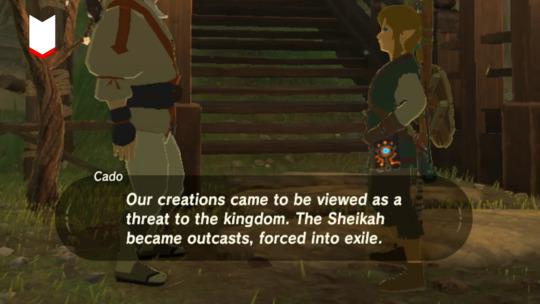
Image credit goes to YouTube user Macintyre.
The royal family’s actions are never directly described as “these were horrible things that happened.” Instead, it’s simply, “yeah, it happened.” There is no acknowledgement that the Yiga was created by the royal family’s own hands, nor is there any emphasis placed on the impact any of these acts have.
For example, the exile of the Sheikah wasn’t even the first instance of the royal family of Hyrule mass-exiling a group of people and displacing them from their original homes.
After the events of Ocarina of Time, Ganondorf is captured and executed for his crimes leading up to the events of the game and presumably the events of the Adult Timeline, given Young Link’s testimony. (I’ll get into why the King of Hyrule believes Link over Zelda later.) After Ganondorf was executed, the Gerudo were forced out of Gerudo Valley and banished from the Haunted Wasteland. Even during the events of Twilight Princess, the Gerudo Desert is completely abandoned. Once again, there is no discussion concerning the royal family’s actions, with the narrative instead being that the Gerudo, some of whom were actively against Ganondorf’s actions and many of whom were hypnotized during the events of OoT, are entirely at fault and have to atone for their sin of… having Ganondorf for a leader, I suppose.

Source: Creating a Champion, p. 405
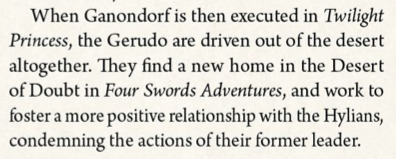
Source: Hyrule Encyclopedia, p. 46
The royal family gets to punish an entire people for the actions of one man. Rather than the act being portrayed as negative or even discussed, it’s hardly even mentioned.
While I’m aware Encyclopedia’s canonicity is dubious at best, its material was still approved for publication by Nintendo. Thusly, I feel it worthy to discuss.
To summate, the royal family did bad things, and very select few acknowledge it.
Next point.
- “I think that the Zelda/Hylia = good Ganon = bad situation serves a narrative purpose that justifies the black and white nature of the games because it highlights the shades of gray in between installments…”
The Legend of Zelda is almost thirty-five years old. This series should have long evolved beyond the black-and-white-morality narrative, especially when the side we’re supposed to sympathize with literally used the Sheikah to commit war crimes. You don’t have to have stark white and pitch black in order to see shades of gray.
- “… And trying to assign Zelda a dark side is kind of missing the point, especially when no one seems to question Link’s morality even though he’s constantly stealing people’s stuff.”
Examples of Consequences to Link Stealing People’s Stuff
1. In Twilight Princess, stealing from Trill will result in the bird branding you a thief and pecking you every time you come near him, which will only cease when you finally pay up.
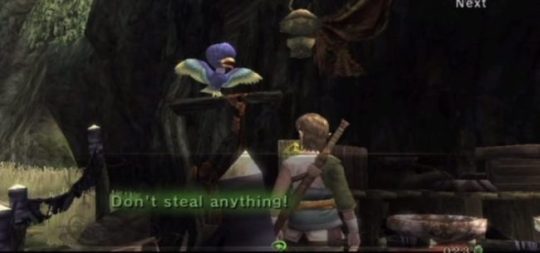
2. In Link’s Awakening, stealing from the old man’s shop will result in instant death the next time you enter his shop. If you steal, your name is changed to THIEF for the rest of the game.

Furthermore, Link is controlled by the player; thusly, his actions have no consequence to the story or Link’s character. Zelda, on the other hand, is an active participant in the story, whose actions and whose family’s actions weigh heavily on the games. That’s not to say Zelda is ever evil. However, as much as she is a victim of her own family’s history, she still has just as much power to change it.
- “If the games wanted to gloss over the sins committed by the royal family[,] they wouldn’t have designed entire dungeons around them.”
I reiterate: the sins of the royal family were mentioned once, and then immediately dropped shortly thereafter. It’s not there for you to dwell upon, merely window dressing as if to say, “Yeah, that happened.”
- “I believe The Legend of Zelda series is a critique of the Divine Right of Kings”
Until the events of Skyward Sword, the Hylian Royal Family wasn’t a divine lineage. A thirty-five-year-old series can’t be a critique of a concept that it barely even acknowledges. The only emphasis placed on the “goddess blood” part of the royal family is in Breath of the Wild, in relation to Zelda having to unlock her sealing powers. Despite the massive repercussions the revelation of the royal family’s lineage tying back to divinity should have, it’s barely even mentioned,let alone discussed.
As a side note, the divine right of kings specifically denotes that the monarch is chosen by God to rule. In contrast, the Hylian Royal Family continues to rule by, presumably, claiming lineage to the Goddess Hylia, which is closer to traditional practice in feudal Japan.
- “If the Divine Right of Queens is indeed present, does that justify a hereditary monarchy? As far as the Legend of Zelda is concerned[,] the answer is no.”
The Legend of Zelda series never questions the validity of the royal family’s rule.
- “Isn’t it funny that the Kingdom of Hyrule seems to be perpetually stuck in the dark ages?”
Ocarina of Time has neon lights, jukeboxes, and canned goods. The lakeside doctor’s chemistry is advanced enough that he is able to synthesize eyedrops. Given the newspaper articles strewn about shops, Hyrule also has pictoboxes in OoT.
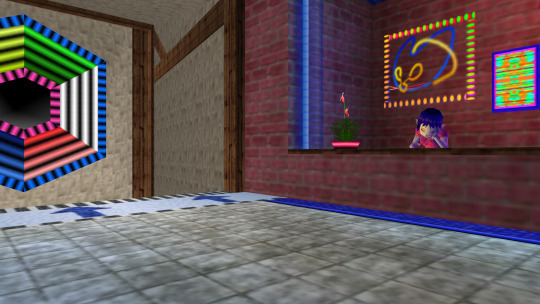
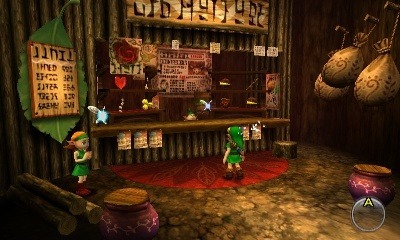
By Wind Waker, pictoboxes have evolved to print in color. In Phantom Hourglass, Linebeck’s ship is steam-powered.
In Twilight Princess, pictoboxes now print higher quality images. In addition, with the introduction of Malo Mart’s Castle Town branch, TP is confirmed to have fully functional electrical lighting in some places. Cannons are so safe, you can get launched out of one for fun. Pyrotechnics have grown advanced enough that explosives can function underwater, and Death Mountain has become a functioning, refined mining facility stable enough for Hylians to safely walk in. Also, Auru has a bazooka.
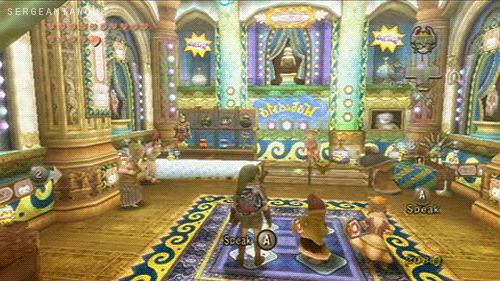
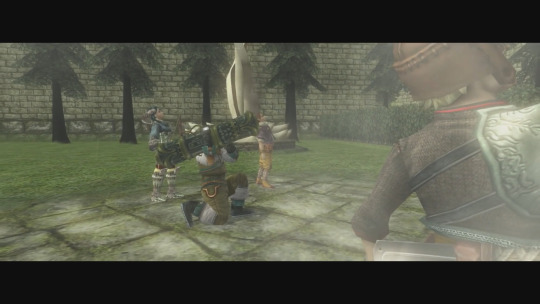
SPIRIT TRACKS HAS TRAINS. THEIR AESTHETIC DIRECTLY REFLECTS THE INDUSTRIAL REVOLUTION.
Hyrule is hardly stuck in the dark ages. It’s high fantasy.
Next point.
“For starters, I want to establish that I don’t agree with the assumption that what the Hyrulean Royal Family does = Zelda/Hylia would do. I don’t think it’s a mistake that almost every text in the OP explicitly mentions that it was a King that committed those acts, not Zelda herself.”
Once again, that was an error on my part. It wasn’t my intention to imply Zelda had any part in such actions. However, Zelda learns how to rule from her father, or her mother, or whomever holds the throne in that particular moment. These acts are never questioned in canon beyond “Yeah, that happened,” and the most conflict we have is the issues between Zelda and her father in Breath of the Wild boiling down to how to confront the Calamity—science vs. sealing magic— rather than anything else.
It’s a personal issue, and Rhoam treats Zelda terribly, essentially alienating himself from his own daughter and treating her as little more than a pawn. I agree that it’s absolutely terrible. However, that’s merely a personal issue. She’s complicit in how Rhoam addresses the Sheikah, possibly even fully aware of the anti-aging rune Purah was developing to force retired soldiers into battle against the Calamity, and from what we’ve seen in Age of Calamity, she doesn’t have an understanding of the Yiga Clan other than the snide remark Urbosa gives:

Image credit goes to YouTube user BeardBear.
It’s up to Zelda to develop a deeper understanding of her country’s history; not to take personal responsibility, but to understand where those who are suffering are coming from.
That said, acting with the Hylians’ best interests at heart is exactly something Hylia would do.
In the prologue to Skyward Sword, the Demon King and his army attack the Hylians, slaying many and throwing the world into despair. Thus, the Goddess Hylia saves the Hylians by sending a chunk of land up into the heavens, sparing them from the war to follow while she gathers every other race to fight alongside her.
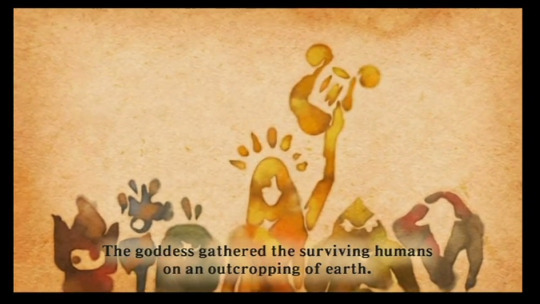
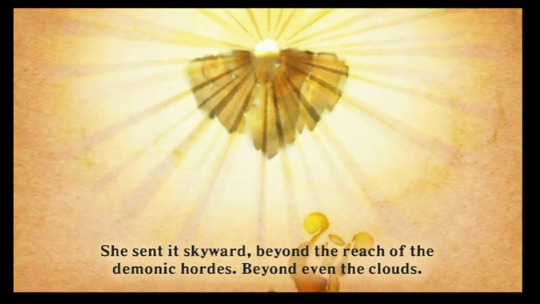

So… How come Hylia only saved the Hylians?
I understand many were wiped out by demons, but if Hylia was fully prepared to spare people from violence, why not also send small numbers of every other race? Why only save the Hylians, her chosen people, while essentially dragging everyone else into battle with her? Furthermore, when Hylia’s immortal body suffered grave injuries, she opted to take advantage of this by choosing to be reborn as a person. Not only is it explicitly stated that Hylia reincarnated in order to utilize the Triforce’s power, as she could not do so as divinity, but she knowingly chose to be reborn as someone who would become close with her chosen hero, in order to influence him to follow her plan without hesitation.
Hylia used Link.
That much is certain, and it’s laid out clearly by Zelda shortly before she takes Hyrule’s longest beauty nap.
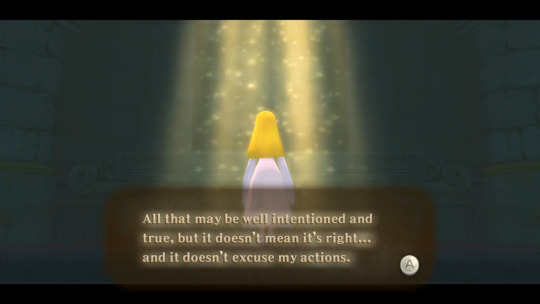
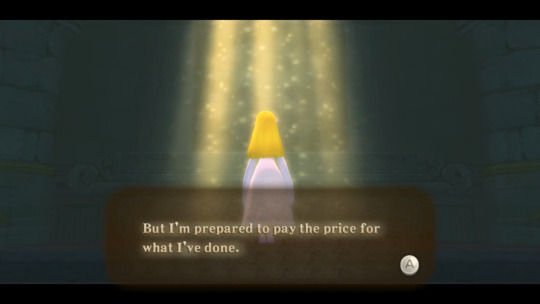

It must be noted that while Zelda states she is Hylia reborn, and has regained Hylia’s memories by this point, she still sees herself as a separate entity from Hylia. While she herself is immensely guilty and apologizing over and over for what she’d done in her previous life, we have no way of knowing if Hylia herself would react the same way.
In fact, according to a fan-translation by ZeldaUniverse user Yamikawa, Demise goes as far as to describe Hylia as “brave and so-prideful,” hinting that even a being who loved her chosen people so much to save them still saw them as beneath her, if being reborn as human is seen as such a drastic extreme contradictory to her supposed character. Now, this is merely reflection on the inner workings of the Demon King, so his word can’t be taken as gospel. But, like all things, I find it interesting.
From what I can gather, however, Hylia certainly cared more about the Hylians than any other being in the land of Hylia, not dissimilarly to the royal family.
- “I also don’t think that every princess Zelda is a Princess of Destiny or Representative of Hylia, I think that she reincarnates just about as often as Link and Ganon(dorf) do, because the logistics don’t really work out otherwise. This leaves hundreds, if not thousands of years where Zelda/Hylia isn’t on the throne.”
This is merely speculation. Moving on.
- “There’s a notable trend of the King of Hyrule getting in the way of Zelda’s attempts to save the kingdom. First[,] he doesn’t take Zelda seriously [in] Ocarina of Time, forcing her to rely on Link […] I don’t know why the King of Hyrule was willing to listen to a random boy claiming to have been from the future over his own daughter but whatever I guess.”
The King of Hyrule believed Young Link because he came back to the Child Timeline with the Triforce of Courage. Up to that point, the whole Triforce was supposed to be safely locked away in the Sacred Realm, which was supposed to be completely inaccessible without the spiritual stones and the ocarina of time, neither of which Link had. I’d listen to the kid’s story too if he came back with a God Dorito on the back of his hand.

- “And then again in Breath of the Wild when Rhoam bans Zelda from ancient tech research despite the fact that he has absolutely no reason to believe his pray the incompetence away method is the right one.”
The tapestry showcasing the events from 10,000 years ago depicts a princess possessing the blood of the goddess using her sealing magic in order to seal away Calamity Ganon. Link can swing the Master Sword at Ganon or whack him with ancient arrows or light arrows all he wants. Without the ability to seal away the darkness, as shown at the end of Ocarina of Time, all of this preparation and planning would have been for naught. That is why Rhoam is so harsh on Zelda. That’s why so much emphasis is placed on unlocking her power. Without it, defeating Ganon would be impossible.
On that note, Rhoam also had no idea what he was doing. Zelda’s mother was the one with the sealing magic, not him. She was supposed to be the one to train Zelda, but she passed away before she got the chance to even start. He puts so much emphasis on prayer rather than ancient technology because he genuinely doesn’t know what else to do.
I can’t believe this post forced me to defend Rhoam of all people I’m gonna have a stroke—
- “Also, this is purely speculation, but [I’m] pretty sure there’s an implication that King Daphnes Nohansen caused the flooding of Hyrule in Wind Waker […] This sounds like a wish on the Triforce that backfired[,] but I digress.”
Daphnes couldn’t have made a wish on the Triforce before Wind Waker because, when the Hero of Time left the Adult Timeline, that timeline’s Triforce of Courage shattered into eight pieces and scattered throughout the land—er, ocean. Even if he had Wisdom on him, Ganondorf still possessed the Triforce of Power when he was sealed away, and he wasn’t going to let go of it when he broke free.
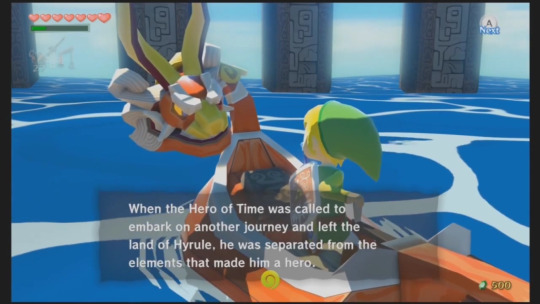
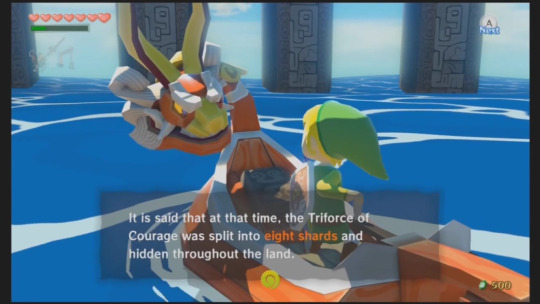

Besides, if Daphnes did wish on the whole Triforce, it would have disappeared. There would have been no Wind Waker.
- “When she saves Hyrule in spite of interference…”
I’m not even going to finish the quote because the entire paragraph is too much for me to unpack. I’m assuming they’re saying that Zelda is never the one truly in power, and the royal family takes advantage of one Zelda’s good deeds to get brownie points.
However, concerning the first line…
In Ocarina of Time, Zelda going behind her dad’s back to try to “save Hyrule” leads Ganondorf straight to the Sacred Realm. Even though a time paradox leads to everything turning out okay in the end, the bleak future was created because Zelda wanted to play hero and pulled Link along with her. Even if Ganondorf managed to wrench the spiritual stones away from the Zora and Gorons, he wouldn’t have been able to access the Sacred Realm if Zelda didn’t send Link there to pull out the Master Sword, which Ganondorf would have never been able to touch. By all means, Ocarina of Timehappened because a little girl was in over her head and tried to take matters into her own hands when her dad didn’t believe her.
Aside from Breath of the Wild, there’s no other “interference” from the royal family that Zelda has to face.
- “Zelda is the representation of a deity, so it makes sense that people would worship her to some extent, and having a goddess on the throne [probably] blesses the land. So[,] while the kings of Hyrule have a tendency to screw things over, [it makes sense] for Hyrule to be a monarchy because Zelda’s power as the goddess incarnate is needed to defend against Ganon and other threats, [r]ight?”
I acknowledge the author is attempting to portray the royal family’s possible justification for their rule. However, until I reached the succeeding passage, I believed it was the author making this justification, given how the entire paragraph preceding this was pure speculation. Once again, this passage is speculative, as nobody in Hyrule has ever explicitly given any notable opinion concerning the royal family. Why try to justify your rule when nobody’s criticizing it?
Since the author brings up Zelda being a representation of Hylia, however, it does bring to mind a particular problem I have with the royal family suddenly being goddess-blood.
It completely recontextualizes the relationship between the royal family and the Sheikah.
According to Creating a Champion, the Sheikah have a deep devotion to the Goddess Hylia. Since the royal family is descended from the goddess reborn, the Sheikah thusly are deeply devoted to the goddess Hylia.
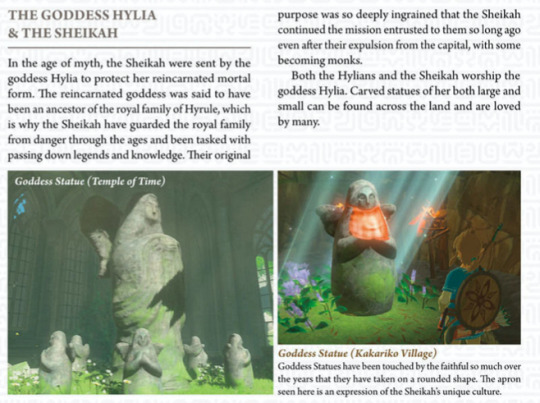
Source: Creating a Champion, p. 372
Now, the royal government using a minority group of people to do your dirty work is already scummy enough when you’re just a normal royal. In this case, however, the Sheikah are so devoted to their goddess that they will do anything for you. Whether it’s because certain monarchs are a “representation of a deity” remains to be seen, but the point is that they’ll do anything for you.
And the royal family takes complete advantage of a group of people unconditionally loyal to them, bidding them to do unspeakable things in the name of their religion, which for all intents and purposes is the royal family.
That’s absolutely deplorable, and it’s a wonder nobody’s brought attention to it yet, whether in-canon or in-fandom. What’s more, given how Impa is always Zelda’s attendant, this relationship is never questioned or criticized, whether it be by the Sheikah or Zelda herself.
And that’s terrifying.
- “The reason Ganon is always an antagonist is because he’s the vessel for the curse of Demise.”
Demise was introduced in Skyward Sword. Demise is the root of all evil, the creator of monsters and conjuror of demons. He is pure evil in every sense from the word, the Zelda series’ version of Satan. Naturally, he’s as simple as you can get in terms of character. Barebones characterization, providing only just enough to tell the player exactly what they need to know:
He’s evil, he’s powerful, and he wants the Triforce. You have to stop him.
Ganondorf existed before Demise. Ganon had over twenty years of development before Demise brought his progress to a permanent flatline.
Who was Ganon before Demise?
Allow me to remind you.
In The Legend of Zelda, first released on February 21st, 1986, Ganon is simply described as “the Prince of Darkness,” and steals the Triforce of Power when he invades Hyrule. After the Triforce of Wisdom is shattered, he kidnaps Zelda.
He’s evil, he’s powerful, and he wants the Triforce. You have to stop him.
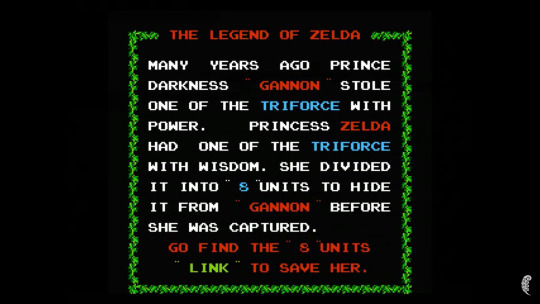
Although Ganon doesn’t physically appear in Zelda II: The Adventure of Link, released in 1987, his presence is still felt as his minions pursue Link in order to revive the Prince of Darkness. In fact, the game over screen is the successful revival of Ganon.

Now, given that these are the first two games in the series, it’s perfectly alright for Ganon to be as barebones as he was. After all, many villains at the time were the same way, with the most notable of Ganon’s counterparts being Bowser from the Super Mario Bros. franchise.
However, with innovation of technology comes innovation of narrative, and it’s with the release of A Link to the Past in 1993 on the SNES that we begin to see Ganon develop as a character. In the prologue to ALttP, Ganon is revealed to have once been human; he is given the name Mandrag Ganon—or Ganondorf Dragmire, as we now know him—and he was once the leader of a band of thieves who sieged the Sacred Realm and took control of the Triforce after murdering his own followers.
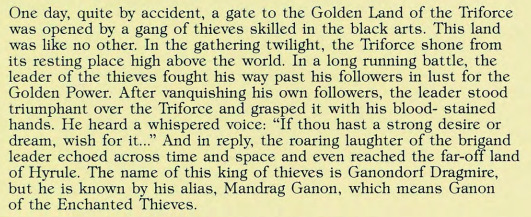


Source: A Link to the Past SNES game manual
Ganon is still irrevocably evil, but in this case, we begin to learn more about him. We begin to see a character starting to form. One who isn’t just mindlessly evil, but who has the charm and wit to infiltrate Hyrule Castle and earn the King of Hyrule’s trust in the guise of Agahnim. Ganon was also a very capable leader, having successfully led his band of thieves straight to the Triforce. Even after wishing upon the Triforce and corrupting the Sacred Realm, Ganon’s power attracted followers in the form of greedy, power-seeking people. He’s powerful not by brute force alone, but through his cunning use of intellect.
Ocarina of Time served to further develop Ganon in little ways. For example, this is the first game wherein, for the majority of the game, Ganon is seen and referred to by his human form: Ganondorf. Ganondorf is shown to be powerful enough and stealthy enough to infiltrate the homes of the Zora, the Gorons, and the Kokiri, and send dangerous hazards their way in an effort to seize the Spiritual Stones. At the same time, he is first seen at an audience with the King of Hyrule, as if there for diplomatic reasons.
Although Zelda sees Ganondorf as evil because of her prophetic dream, the King of Hyrule doesn’t believe her. Because of this, we can infer that Ganondorf has enough charm and charisma to, if not win over the King of Hyrule, not be seen as suspicious despite the horrible acts he’d committed, not just in the past, but at that very moment. He’s also shown to be highly cultured, shown at the end of Link’s ascent up Ganon’s Tower. Not only is Ganondorf playing his own theme, but he’s doing so on the pipe organ, which is notoriously one of, if not the most difficult musical instrument to master.
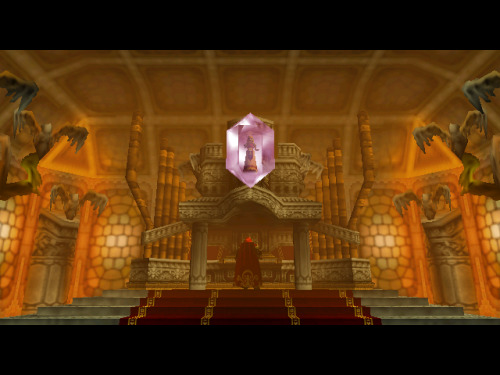
Once Ganondorf seizes the Triforce of Power, the kingdom of Hyrule is subjected to seven long years of his rule. During this time, normal people such as Ingo succumb to their greed and follow Ganondorf’s influence in pursuit of power and riches. Although Malon is naïve enough to believe Ingo was somehow under Ganondorf’s control, it’s clear to players that he was completely in control of his actions, and that Ganondorf’s rule brings out the worst in seemingly average people.
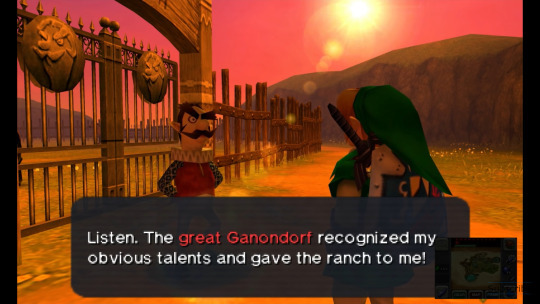
Image credit goes to YouTube user ZorZelda.
Even a Hylian knight can fall under this influence, with it highly inferred that the knight who once guarded a room of pots for Link to smash is now a twisted poe collector, the man even stating that he likes it better this way.
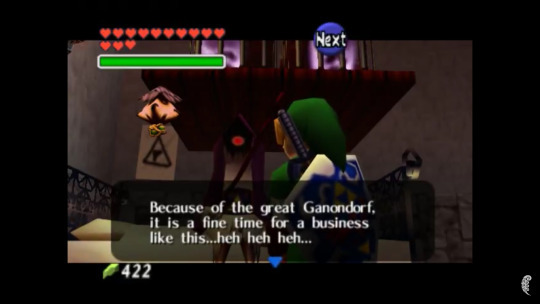
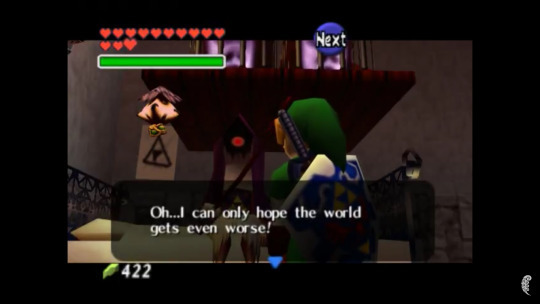
In Wind Waker, we finally see a more introspective side to Ganondorf. While he’s just as ruthless and fully ready to murder a child in the name of accomplishing his goal, he reveals the reason that started him on his path of darkness:
His people were suffering, and he wanted for his people what Hyrule had. He believed that taking Hyrule and taking the Triforce meant that his people could finally live freely, away from the harsh desert.
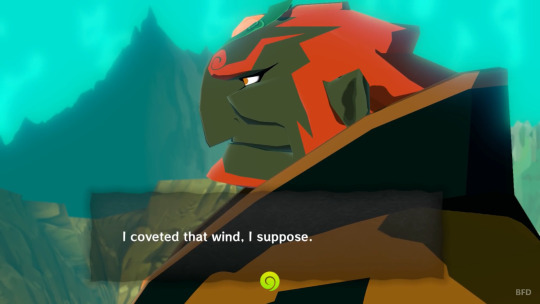
Now, I’ve seen this challenged time and time again. Was Ganondorf lying to distract or manipulate Link? Was he telling the truth? Is this what Ganondorf has convinced himself to believe, after so much time sealed away and in isolation? We will never know, and that’s part of what makes the game so interesting. Ganondorf’s portrayal is a large part of why so many people love Wind Waker, and it’s not hard to see why.
Perhaps the darkest the Zelda series has ever gone in terms of the Triforce’s power was in Twilight Princess. After freeing Lanayru, the Light Spirit warns Link of the dark power he seeks, the Fused Shadow. In order to do this, she explains the history of the Triforce, and the bloodshed brought by its allure to the darkness in the hearts of men. Before the construction of the Temple of Time, many battles were fought, and one of them was the “Interloper War” that inevitably resulted in the creation of, not only the Light Spirits, but the Twili and the Twilight Realm.
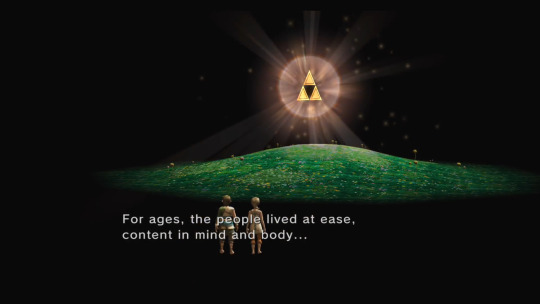

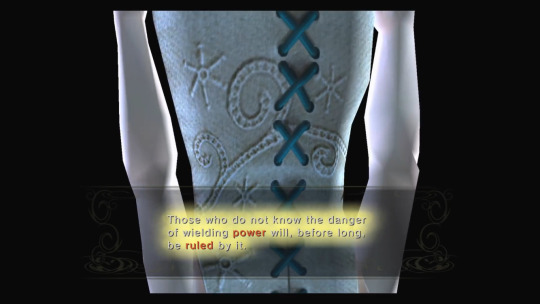
It’s important to note that Lanayru’s cautionary tale highlights that Link, the hero of the story, could succumb to the allure of the Triforce and dark magic just as easily as any other person. In this particular case, anyone could have fallen down the same path as Ganondorf. If anything, this tale is one of the most important bits of lore to take into consideration when discussing the series.
Anyone could have been in Ganondorf’s shoes. It could have happened to anyone.
Then, in one fell swoop, Skyward Sword ruined it.
In a single game, every bit of progress on Ganondorf is lost. Once again, we’re dragged down to the baseline characterization from the original game.
He’s evil, he’s powerful, and he wants the Triforce. You have to stop him.
Suddenly, everything the previous games had built up no longer matters. There’s no longer a need to question whether what Ganondorf did was solely out of greed, but also out of what he felt was necessity. There’s no need to wonder if Ganondorf was once a rational man, who succumbed to the irresistible pull of the Triforce like so many before him.
Ganondorf is, purely and simply, the reincarnation of Satan, so there’s no need to go any deeper than that.
And that’s why I hate this “vessel of Demise” thing. It completely undermines everything Ganondorf once was and reduces him to a single, cardboard cutout of a villain.
Moving on, before I get sad.
- “This curse is specifically tied to Hylia’s bloodline and the Link’s soul, which is pretty specific…”
Demise’s curse is essentially dooming the earth with a never-ending rebirth of his hatred; his malice, if you would. The wording of his curse is specifically “people like you,” which could mean that it isn’t Link and Zelda’s exact souls that are tied to his hatred. Rather, people possessing the blood of the goddess and a heroic, courageous soul are doomed to deal with this curse.
However, my thoughts on this matter are pure speculation.
Also, Demise specifically targets his curse at people like Link and Zelda because they were the ones to kill him in the first place. That much is obvious.
- “… [So] why do the clashes with Ganon always throw the fate of Hyrule into disarray? Because Zelda’s bloodline runs the country.”
Ganon would attack Hyrule even without Zelda’s family in charge. His pursuit of power and domination of the Triforce/Hyrule is therefore closely tied with the fate of Hyrule. Goddess blood on the throne has nothing to do with it.
- “If Zelda came from a small town the curse would probably manifest in peril for that one region which isn’t great but it’s better than an apocalypse.”
Firstly, this is a run-on sentence. Secondly, I reiterate: Ganon would attack Hyrule as a whole, regardless if Zelda’s bloodline was on the throne. It wouldn’t matter if Zelda’s whole family suddenly moved to the countryside. When Ganon inevitably comes back, he’s still gonna go straight for the Triforce or to conquer all of Hyrule. Goddess blood isn’t even part of the equation for Ganon. And if goddess blood isn’t there to stop him, then that’s even better.
Alright, so I’m not even going to bother gratifying the last two paragraphs of the response with an answer, because it’s all rambling that has nothing to do with the original argument. Relinquishing the throne would do nothing to right any wrongs dealt to the many people who were hurt, and evil doesn’t care about a single princess with goddess blood or a boy with a pointy stick.
In conclusion, the addition of Hylia made it so that the royal family’s power dynamic with the Sheikah is even more critically imbalanced than it originally was, making the exile of the Sheikah 10,000 years ago even more heinous than it originally was. Yet, because Hylia is portrayed as wholly good and incapable of doing wrong, despite in-game evidence to the contrary, the royal family, and Zelda by extension, will never be criticized for any wrongdoing. In fact, doing so may well be heresy, if the responses to my original post are anything to go by.
By comparison, the addition of Demise diminishes Ganondorf’s character, rendering him down from the makings of a complex, human character—where anyone could have easily been in his place and had the same greed and ambition for power—into simply the reincarnation of the literal devil, where of course he’s evil, and you don’t have to do any digging beneath the surface. Ganondorf is the reincarnation of Demise, or his hate, or his vessel, so he’s pure evil and nothing more.
And that’s the greatest disservice Nintendo has ever dealt to The Legend of Zelda.
#legend of zelda#ganondorf#princess zelda#breath of the wild#botw#loz#tloz#ocarina of time#twilight princess#zelda#link to the past#alttp#wind waker#ganon#the legend of zelda#hylia#goddess hylia#demise
46 notes
·
View notes
Note
Do you think the DC fandom maybe, Infantilizes Tim a little too much? Like for a rich kid character who's main trauma for a long time was a getting left home alone too much there's an oddly amount of meta abt how much how much his parents hurt him~ compared to, y'know the two poor characters who grew up with physically abusive dad's+druggie mom's, or the two that were raised assassin cult's, etc
…well, yeah, I do kind of think that? His whole schtick for so long was being too old for his age in ways that didn’t sacrifice his jokey, relatable teenager energies. It’s weird how little of that we see anymore, sometimes.
And then DC broke him and discarded him and he’s sort of awkwardly hanging around getting reimagined as more woobie with every fan generation. It is weird!
But tbh I do get it. And I think the reason his parents’ failure of him and his vulnerability get played up so much, and Jason and Steph’s sufferings (while used a lot for things like motivation and context) not dwelt on quite so much in the same lugubrious style, are kind of the same reason.
Which is that canon didn’t commit to it. Jason and Steph’s experiences with bad parenting were foregrounded and retconned more dramatically awful several times. (There’s some definite classism in how that was approached imo, and I’m never budging on being mad about DC retconning out Catherine being sick and then ignoring her forever in all Jason characterization because a drug death invalidates a person ig, great message during the opioid crisis guys.)
They engaged and coped with it–Steph (and Cass, our #1 canon batfam parental abuse victim) pretty directly, Jason a little less so because of the dubious and fluctuating canon status of most of the content more specific than ‘poverty, homelessness, theft, parental drugs and crime in there somewhere,’ so most of his parent issues have been focused on Bruce. He sure has dug into them tho. 😂 Rarely well or productively, thanks DC, but it’s explicitly part of his character, is my point.
Whereas upper-middle-class Tim was always treated by the narrative as fortunate and unharmed by his experiences with his parents. Even though they were clearly behaving badly in several ways, and Tim showed signs of being harmed by it.
Tim outside of immediate moments of frustration always was of the opinion he was Fine, and Very Fortunate Actually.
Therefore a huge chunk of the numerous everyone who’s got parent-related mental and emotional harm, but has struggled to have that validated and hasn’t responded with a lot of anger toward the parent, identifies with Tim. The only one who’s never really lashed out at his parents for fucking up with him. The one who still needs it explored, because canon ultimately didn’t.
[editing post to put in a readmore because lol it’s long, post otherwise unchanged]
(Dick obviously didn’t ever have any Issues with the Graysons, but he Angry Teenagered at Bruce so hard it changed Bruce’s characterization permanently, rip.)
The things Jason, Steph, and Cass have been through are dramatic, obvious, and fit stereotypes because that’s what they’re based on.
That’s important content to have, but because it’s right out there in your face even people who identify with it quite a lot are less likely to feel the need to work all the way through it again in fanworks. That part’s there. It’s text.
(Well actually Jason having been physically abused kind of wasn’t? I think? It was mostly assumed on the basis of stereotyping and Jason’s not caring about the man much even as he felt possessive of information about his death, which is valid. I don’t actually know what’s up with Willis now, Lobdell did some weird shit that lacked emotional resonance or staying power because he’s Lobdell and has no soul.
Cass’ wandering years are also ludicrously underdeveloped. But very very few comics fans or writers can personally relate to being amazing child warriors with no grasp of language living feral under bridges. That part of her life is consistently represented in terms of absences, in terms of its deviation from the norm and the deficits of normality it left her with, which is typical but unfortunate.)
-
The interesting things to do with these characters are often informed by the bad stuff in their childhoods, but there’s relatively rarely that much more to say about the fact that those things were bad. They know they’re bad. They’ve had a lot of on-panel rage about it, as discussed above. Steph and Cass both beat the shit out of their dads.
Jason is, in fandom especially, a sort of Platonic ideal of a kid who’s mad about his bad childhood and really bad at figuring out where to point that rage.
(Damian is a whole other kettle of fish, because he’s been lumbered by so many detailed retcons coming so fast no two people can seem to construct compatible models of what his early childhood was like, and even more because he’s still ‘a child’ enough that he’s necessarily in a different stage of processing than someone who’s officially only a few years older than him at this point, but still functionally 8 and also 20 years older, and whose parents are no longer in the picture to continue screwing up.
Also there’s no question that if he brings up an abusive thing the League did, he will be validated by his current environment about his realization that it was in fact bad. There’s a lot of fic on that theme! But it doesn’t have the same tone precisely because it is usually understood that that support will be there if he wants it. Realizing that his previous context contained things that were wrong keeps being made the focus of his arc.)
The badness of Tim’s childhood, on the other hand, was mainly in subtext. Even when we were clearly meant to understand Jack was fucking up, like when he canceled plans with Tim at the last minute to go on a date with Tim’s stepmother, or that infamous time he came to apologize for not being a great parent and got mad Tim was distracted by a crisis on TV so he flew into a rage and took the TV and smashed it and was like ‘that’ll teach you,’ it wasn’t leaned into.
The story didn’t treat Jack as a minor villain to be overcome but like a sort of environmental hazard of childhood, like homework, to be endured and coped with. Tim said things like ‘it’s fine’ and ‘at least he left the computer.’
(And like. It’s not about having a TV and computer in his room. It’s about not letting a child have boundaries, pointedly not respecting a child’s possessions, creating an emotionally insecure environment, punishing minor infractions in proportion to their momentary impact on your own ego, physically lashing out at a proxy for the child…)
Rather like Tom King later didn’t understand about the punching from Bruce, whoever did that story (probably Dixon? I don’t care enough to check) did not understand how serious a case of bad parenting that scene was. That is most definitely textbook abusive behavior. (It’s a hell of a lot more common abusive behavior than being a lame supervillain or shooting you when you screw up, and a lot more specific than ‘was a thug, might have hit me, dead now.’)
And Tim was never allowed to be mad at his parents about it. It was fine. He needed to be ignored so he had the freedom to be Robin. He deserved his dad being mad at him because he was keeping secrets. He complained too much, although objectively he did not.
The universe punished him for ‘complaining,’ more than once. We cut straight from him shunting aside his disappointment that his postcard from his parents was just to say they weren’t coming home yet after all with ‘if it will stop all the fights they’ve been having lately it’s more than fine’ to them getting kidnapped.
He agreed not to come on the rescue mission. His mom never made it home, and his dad was in a coma for a while. And then ultimately Jack died as a result of Tim’s decision to be Robin, immediately after finally deciding to accept it.
So Tim walks around feeling a huge burden of responsibility for his parents’ deaths, and completely unable to process any hurt they did him as real or valid, especially in comparison with the far more blatant awfulness other people have been through, and canon is clearly never going to address it. Or even acknowledge it properly.
Let me repeat that because it’s kind of my main point:
People are fixated on getting Tim’s emotional abuse validated because that’s an incredibly important step in recovering from emotional abuse, and it’s one canon consistently denied him.
How ‘bad’ things are ‘in comparison to’ problems other people have is a bad and unhealthy way to engage with trauma. Okay? That’s just a really harmful framework to apply to pain.
It’s also a way that both Tim and people with experiences similar to Tim’s are encouraged to engage with their own experiences, compounding the existing problems.
So. Not a form of relatable DC was ever actually aiming for when they tried so hard (and pretty effectively) to make him a relatable character as Robin, but an enduring one for a lot of fans.
-
So Tim’s childhood is a natural target for fanworks in a different way than the traumas that have been made explicit and taken seriously by the text. And then a lot of that got compounded by the way the introduction of Damian as Robin was handled, and the lack of resolution that got. And his current status as not quite having a place in the family anymore.
So between the level of projection encouraged by that context and how relatively difficult to access Tim’s Robin run has become ten years after the fact, this has led to a lot of fanworks on these themes that are based mostly on other fanworks, and stray further and further from the original content.
So at this point there’s an entire wing of Tim’s fandom wherein this side of him has expanded enormously, and he primarily exists to suffer, frequently in ways that 1) escalate to a point that is inarguably ‘valid’ and hard to dismiss and 2) set him up to rebound from it in whatever way the writer finds emotionally satisfying or useful–being ultimately cared for and reassured by people who value him (the most infantilizing option but like, popular for obvious reasons), or unveiling his brilliant scheme that was causing him to pretend to be passive in the face of mistreatment, or turning around and using his genius ninja skills to wrest power back from his abusers, or just laying down some sick burns about being treated fairly.
But not that many of the last one, because that’s mostly done with other batfam members.
Tim’s become a vehicle for a lot of vicarious coping that Steph and Jason just aren’t appropriate for, because they get angry and they get even. And those are stories that exist already, so there’s less scope for telling your own.
And because Jason’s reaction pattern is ultimately so masculine (i’ll make them all sorry! with my guns! blam blam!) while Tim’s is pretty gender-neutral, the demographics of fanfic mean that the bulk of the people using Tim vicariously in this manner are female-aligned, which has over time feminized this archetype of him a lot. Sometimes in ways I find really uncomfortable, like there’s a lot of forced pregnancy stuff which activates my panic buttons. x.x
But, ultimately, it’s fandom. People are going to do what they’re going to do, DC in their perpetual fail has hung Tim out to dry in narrative terms, and I’d rather the people who are using Tim for victimization narratives over the people who can’t dismiss or discredit him fast enough now that his position has been filled. 🤷♀️ What we gonna do? Fave’s in an awkward spot. DC hates us. This is the life in this comic book pit. XD
-
Also if you’re the same anon who left me a callout about op of that weird Steph post in my inbox, or if you aren’t @ that person, 1) I refuse to get involved so I’m not answering that ask 2) those aren’t even particularly dramatic fandom crimes? That’s pretty normal? That’s just…Caring Too Much About Ships And Disagreeing With Me.
Do I also feel those opinions are kinda bad? Yeah. But I disagree with everyone about something. Chill.
#tim drake#child abuse#characterization#fanworks#fandom#batfam#emotional abuse#neglect#validation#projection#vicarious re-parenting of self#coping mechanisms#recovery#i ramble#this took too long already i'm not rewriting it into a well-organized essay#opinions#comics#in the end we are all Superboy Prime#hoc est meum#a nonny mouse#ask
341 notes
·
View notes
Text
hdm theory: dust is actually harmful
Dust is actually harmful. Not in the sense of being sin, but it is ultimately what damages people from different universes to stay where they don’t belong. Stay tuned for what I consider to be wildest, craziest, most senseless theory I’ve ever written. Keep in mind this isn’t super serious, I’m aware there are gaps in this theory (because I accidentally countered my own arguments as I was writing lmao) and beware spoilers for both trilogies. Under the cut because it’s long-ish.
Mrs. Coulter’s research.
We know Mrs. Coulter created the General Oblation Board to research and examine the readings of Dust in children and how to stop it from settling on them. Outside her other personal goals, which included being in the good graces of the Magisterium, she had an interest in Dust as a scholar, and while she has a lot of dubious actions, it’s fair to say she, at the very least, believed that Dust did something to people. While personally I do not consider Mrs. Coulter a woman of faith, she was raised in a society controlled by the Church - and she has personal dealings with them - so it’s safe to assume she was raised in the dogma that “Dust is Bad” and she believes in it, because why not? I mean, there is a lot of reasoning behind this claim, but none of it is important for this specific theory.
The Magisterium has the narrative, after Dust was discovered and studied by Boris Rusakov, that the particles are a representation of Sin. A lot of the discoveries surrounding Dust connected it to the fact adults seemed more connected with it than children, which only served to help the story that Dust affected children less - especially before puberty - because they were innocent. Once puberty hit, and the daemon settled, a stronger connection with the particles was established and the role of puberty in the “Dust is Evil” story is very big, especially because puberty and sexuality go hand-in-hand for the most part and the Church admonishes the idea of sexuality as a whole (it’s a bit more complicated than just this, but I hope you get what I mean). All of these things contributed to how ingrained the idea of Dust as something bad was perpetuated across Lyra’s world.
It is also rather convenient for the Church to demonise Dust, as they themselves seem to believe it is a bad thing - considering how they are influenced by the Kingdom of Heaven - but their role in making the situation even more suitable for themselves is understandable. If you were to tell an average person about Dust, they simply would acknowledge it as Something or even worse, not know about it, but to associate Dust with Sin - in a world inherently Christian, where people understand that Sin = Bad - makes it a lot easier to spread fear and control the populace. It’s as ingenious as it is evil, truth be told.
With all this in mind, we know that canonically Dust is Not Evil, it doesn’t represent the idea of Sin - or at least, it doesn’t convey Sin as something evil, but rather something the Church is afraid of - but it’s far more complicated and far reaching than that. Dust is everywhere, it shapes everything that has any value, being consciousness or angels or the whole fabric of the universe. However, they are not wrong in claiming that children attract less Dust for a reason or that the daemon settling is the connection one should look for when looking for Dust. In fact, while absolutely unethical, Mrs. Coulter’s research was very close to what makes Dust special, except she turned it to serve the Magisterium’s truth instead of actually looking into it with an impartial mindset.
Dust is everywhere, like I said, including in other universes. It doesn’t just linger in space, it lingers across dimensions and it composes the very fabric of the multiverse. In Will’s world it is known by many names, including shadows and dark matter, and for the mulefa it was known as sraf. I’m not tackling the mulefa’s world here for now, so keep in mind the Shadows and dark matter, because this is more important for this theory.
Even now dark matter is rather elusive as things go in science of our world, but ultimately it is a great part of the composition of the universe, and within the nature of His Dark Materials, it is a parallel to what Dust is.
One of the biggest differences between our world and Lyra’s, is the existence of a daemon. While daemons are representative of a person’s soul and another half of a being, they are not exposed in our world like they are in Lyra’s. In fact, they live within, which is why despite the fear Lyra has when meeting Will for the first time, she quickly calms down because she realises he isn’t missing his daemon, like Tony Makarios was, for example.
It is somewhere within him, and because a person can feel the vibes of someone daemonless (which I talked about in my visible daemon theory), she knows he isn’t separated or completely devoid of a soul, which immediately makes him “human” in her eyes. But the question is, why? Why does Lyra’s world have people with their daemon exposed, taking a physical shape? From the three worlds we visit (Cittagazze, the Mulefa world and Will’s) none of them have their souls exposed like the daemons, despite the mulefa having a bit of a different relationship with Dust with their wheels, and the seed pod oil and all that.
Having a physical soul is anything but practical. You’re exposed, your daemon betrays your feelings most of the time, and sometimes you don’t even get along, which creates conflicts that can lead to your separation, which then again creates even more conflicts, because you become an outcast in a society that thinks being daemonless makes you inhuman.
What if the daemons, exposed like they are and in tune with Dust - as it has been proved by scholars in Lyra’s world - are a lightning rod for Dust and its effects?
Marcel’s Truth
Before we go into the lightning rod theory, we need to discuss Marcel’s hunt for the truth and how it ties to this whole shenanigan.
As I mentioned, Mrs. Coulter’s research was focused on just fixing the problem of Dust in the name of the Church, that is, fixing how Sin was spread through people. Also like I said, I don’t think she believed Dust was really Sin, but she knew something happened when Dust settled on children who were going through puberty, and adults. There was a lot of debate, especially in the academic and scientific field, about the nature of Dust, not everyone believed the Sin theory without question, although speaking openly about it was not possible.
She knew there was something going on - many other scholars knew that too - and her choice was to try and cut off the Dust connection. That is a reasonable response, when you consider how they were taught that Dust was bad and sinful and it damaged humans; you cut the source, technically Dust stops interacting. However, as it is shown, once the daemon bond is absolutely severed, even if the person survives, they are nothing but whole. They feel dead, they act dead, for all accounts; devoid of will and curiosity, essentially sick and incoherent, pretty much the opposite of what attracts Dust and what Dust represents.
This idea of a forced severing is interesting when you see that people who willingly separated do not have any of the collateral damage the Bolvangar children had - or the zombis, for that matter. They still have will, the ability to choose and think coherently, they are alive and well, despite some of them being emotionally damaged, which is a reasonable response. But it’s nothing that truly impairs them from being alive. This is material for a secondary theory, but I think it’s important to consider daemons are people too, they are their own person, with their own desires, their own free will, and because of that, they are allowed to walk away (and so is their human) if they wish to, without destroying their counterpart and therefore destroying themselves. This is what free will means, in essence; and it’s why I choose to use severing and separation as different things (I don’t remember if this is canon, though lol).
With that in mind, we know Marisa chose destroying the Dust connection as a solution, because essentially they thought Dust was bad, harmful. It’s a centuries old dogma, one that is being shaken up in the events of TSC. Marcel’s truth speech changes, well, everything. He doesn’t seem to have an interest in destroying the source of rose oil, an oil that interacts with Dust and it shows something about the nature of the particles that unnerved the Church.
“First, we could suppress all knowledge of it, by rigorous investigation, by ruthless force. (…) The second possibility is to go to the root of the problem and wipe it out. (…) The amount of rose oil that’s ever come this far is very small; supplies of it would dry up and cease altogether, and the problem would wither away. That solution would take longer and cost more than the first, but we could do it, and it would be final. (…) There is a third option. We could embrace the facts. The roses exist; they show us something we’ve always denied, something that contradicts the deepest truths we know about the Authority and his creation; there is no doubt about that. So we could admit it boldly, contradict the teachings of millennia, proclaim a new truth. (…) I haven’t told you the fourth option. Revealing the truth in the way I described would not work. There are too many habits, ways of thought, institutions, that are committed to the way things are and always have been. The truth would be swept away at once. Instead, we should delicately and subtly undermine the idea that truth and facts are possible in the first place. Once the people have become doubtful about the truth of anything, all kinds of things will be open to us.” Marcel’s adapted speech. TSC, ch. 16.
Marcel’s points are all coherent and valid (not necessarily good things though), but I wanna focus on the fact he is far more inclined into changing the Magisterium’s core values than actually trying to destroy the roses, which refuted everything they preach about. We don’t really know what exactly the roses do, other than interact with Dust and make it visible, but we do know that whatever it is, it worries everyone that knows about it.
Personally, I think Marcel is right and that he is inclined to go for the fourth option, which is to create doubt, then reshape the way people think, and a lot of that implies he’s talking about how Dust is perceived, or Sin, in essence. If the rose oil truly reveals the nature of Dust, and that it isn’t evil or sinful, this means the Magisterium needs a headstart in protecting its image of protectors of truth, before everyone turns on them for lying. That, of course, it’s an utopia; like Marcel points it out himself, the rose oil is not that big in quantity for it to spread across the entire world, but even if just groups of people become enlightened in the Truth (whatever that is, because honestly, God only knows what Philman is planning), it could still threaten the sovereignty of the Church.
What’s really important here, however, is that Marcel wants to create a new truth, and assuming he’s trying to reestablish what Sin means, this puts him on the very end of the Dust spectrum: Dust is not sin, not evil, but rather something else entirely, benign, neutral, attached to what makes humanity, human and so on. More importantly, this ties well enough with the idea that I’ll propose in a moment, that Dust is harmful, and that daemons are the only thing actually protecting them. He could, in theory of course, promote the idea that being separated from your daemon is actually good.
The reason why I’m pointing this out now, it’s because it contradicts the main idea of this theory, but I believe this is important to highlight: Dust isn’t Evil. That is canon, and is not widely known by the people in Lyra’s world, but while Dust isn’t Evil, I believe that it is harmful to different degrees.
Dust is Harmful
I know it feels like that wasn’t necessary, but I felt like I needed to put these points on the table, because they are important in their own way. You see, both Marisa and Marcel are dealing with the same subject in different ways, for different reasons, but whatever the outcome of their research, both of them are not truly examining the things that do matter about Dust. Why is it everywhere? Why do settled daemons attract it more? Why are there no side-effects to its exposure? Those are important questions that no one in Lyra’s world seems to be asking, and that could be for a number of reasons, but mainly because the dogma that Dust is Sinful makes these scientists not have an objective eye upon the subject. They are biased; they’re seeking a cure, not a means to harness it, to understand it.
The reason why Dust doesn’t affect people in Lyra’s world is because of their daemons. You see, Dust is attracted to consciousness or anything man-made (like the Knife, or the Alethiometer, I’ll even go as far as say the rose oil, despite the oil not being exactly man-made), and the daemons are in all their essence, a personification of consciousness. Without a daemon, a person cannot be alive; this means that, even separated, people still survive because their daemons are still conscious. Consciousness in Lyra’s world is not associated with the mind, but with the soul, which means the daemons, and they are, in consequence, a magnet of Dust.
Daemons are unique in their own composition: while they possess a physical body, once they are dead (be it their human first or them first), they disappear and leave no trace of their existence. They also do not go to the land of the dead and there are places where the daemons can’t go in Lyra’s world itself (the witch route in Siberia, the Karamakan journey to the red building). This is what I propose:
Lyra’s world has a lot more incoming of Dust than any of the other worlds we have ever visited. This is a bit of a cheap example, but you cannot find dark matter on Earth (as far as my knowledge goes, I genuinely did not go that far into this subject), for example, but Dust does descend upon Lyra’s world and it can be seen and interacted with appropriately through the right means. They are more keen in studying it than any of the worlds we see; for Cittagazze, they only used the potential of Dust to create a knife; in the Mulefa world, they are in tune with Dust, even as the flow is dying, and they accept, but have no active curiosity in studying it (which could be that they are still not at the Tech age they need to be to study this, but this is speculation). Lyra’s world is far more interested in Dust than all of the others, possibly because Dust surrounds everything they do. More importantly, because Dust is tied, intimately, with something they consider sacred, natural, intimate in itself: their daemons.
Dust is the reason why people cannot live in different universes. Every person has their own consciousness, and that is what calibrates you (for lack of a better word) to be exposed to Dust. Everyone is, the books are very clear on stating Dust is everywhere, so everyone is exposed, but to each and every single world, there’s a different amount and how it interacts with people. Will’s world, Cittagazze, and even the Mulefa world, they all have people whose daemons are within, not exposed; they all probably are used to being exposed less to Dust. This is why John Parry gets sick while living in Lyra’s world, and this is why Will and Lyra ultimately cannot stay together. Dust damages people who are not “calibrated” to interact with their ways from a particular world. Lyra’s world has A LOT of Dust, which means it does a lot more damage than for example, Will’s world.
Daemons are the reason why people in Lyra’s world survive the interaction with Dust. You see, having consciousness exposed like they are makes the daemons a proper lighting rod, or a Dust rod if you may. They can handle the interaction with Dust without being damaged because they do not share the same physical composition as their human, and this is something that is particular to the person, it’s a fix from Nature to preserve life. This is why for example, Lord Boreal seems mostly unbothered by his constant multiverse travels. Not only he doesn’t seem to stay long in the different worlds, but he is used to a lot more intake of Dust than Will’s world provides.
I know what you’re thinking, probably: but what about John Parry? or Will? They also got daemons. And yes, they do have exposed daemons that they acquired under different circumstances. Note that I used exposed, because Mary also has a daemon, in a way, that she is taught to see and that she spends a considerable time with the mulefa. But, her experience would have been different because her daemon is still inside.
John Parry’s daemon was acquired when he arrived in Lyra’s world, although it’s hard to say exactly when Sayan-Kötör showed up, but the text implies it was early on his arrival. This is probably the way the world has to try and preserve people that don’t belong there, by giving them the tool they need to harness the extra exposure of Dust. In TSK, John mentions he’s been in Lyra’s world for roughly twelve years, and I think that if he didn’t have his daemon, he probably would’ve gotten a lot sicker, much sooner.
Will’s daemon doesn’t show up when he arrives in Lyra’s world and there are two things to consider here. One of them is that Philman’s plot required him to have Will only find out about his daemon in the end, so showing up sooner would have wrecked the plot. This is probably the actual explanation lmao The second reason is that Will’s daemon wasn’t settled yet, and because of that, Dust didn’t affect him as much, so having an unsettled daemon that wasn’t showing up made no actual difference. He barely got damaged by Dust.
By the end, of course, Will’s daemon settles (although Kirjava is already exposed after the Land of the Dead excursion), so now he actually gets affected by Dust, which is why he will die in a decade or so if he stayed in Lyra’s world.
Before I finish, a few things to consider:
This theory proposes that Lyra’s world citizens could in fact live longer in Will’s world, and this conflicts with the actual canon, of course, as we know they don’t stay together because it is said they’ll both have short lives. However, I do believe a good fix for this gap in the theory is that, while Lyra could live a little longer in Will’s world, doesn’t she mean she should because she wouldn’t be happy; the exposure to Dust she’d receive in his world will be too low in comparison to what she would have been used to. In TSC, there is a passage of Lyra in Smyrna, I believe, and she’s watching the streets, observing as people live their lives.
The street below her was saturated in Dust. Humans lives were generating it, being sustained and enriched by it; it made everything glow as if it was touched with gold. TSC, ch. 27
So, while Dust is harmful depending on where you come from, it is also necessary to make life what it is. Like I’ve pointed out earlier, Dust does something to people, and as it’s been proved in the books, it isn’t evil or sinful, but rather an essential part of life. So, for Lyra to exist in Will’s world, she simply would have been miserable the whole time, which is why it’s better for her not to risk staying in his world just because she could survive longer. It’s not a life worth living.
With this in mind, assuming you’ve read TSC, you’ll know Lyra is under an extreme melancholia, and this is mostly due to the fact her relationship with Pan is wounded, Pan being her lighting rod to Dust. Not only they’re sore with each other, emotionally, but one has to take into consideration that they are physically separated.
So, just food for thought but, if their bond is split like that - and like I said before, they still survive well enough even separated - it’s possible that separation makes it more difficult for Dust to affect the human, instead going more directly onto the daemon, and their connection, being dim thanks to the separation, makes the Dust exchange between them to be lesser than what it is between people who are whole, so to speak.
Taking this into consideration, it’s possible to notice how pretty much every person we see that is 1) separated or 2) daemonless, they’re all unhappy, stoic, or simply not as happy and comfortable with life as anyone else who has their daemon. It’s not that depression is exclusive to people without daemons, but these people have had their means to communicate with Dust damaged, in a way, it’s a thinner connection so to speak, and therefore they are deprived, or at least they are touched less by Dust, which results in them being not happy or feeling like they don’t fit in in the world. After all, Dust is all about what makes life worth living, and these people simply are out of touch with that.
And I think that’s it for this theory! If you’ve read all of this, bless you and thank you, and feel free to add your thoughts to it if you have any!
#hdm meta: dust#hdm theory#his dark materials#the book of dust#this took me forever#but here we are#meta by effie
50 notes
·
View notes
Text
Which Kind Do You Want to Be?
Chapter 7: Last Day
Honoring trust means keeping your promises.
Summary: You’re from a deeply sex-positive culture. He hasn’t gone unarmored in front of another human in... It’s been a very long time.
This is a story about trust and kindness, loneliness and loss, belief and transgression. And two people crossing paths just long enough to find each other.
Final chapter! Want to read the rest? Previous chapters on tumblr here or find the whole story the same username on AO3.
Relationships and characters: Din/female reader (both similar age to Din in canon), Grogu, and a cameo from Peli.
Rating: Mature? Explicit? Anyhow, grown-up sexy stuff. Please be old enough to be reading this kind of thing.
Tags and warnings: Moments of angst, domesticity, kindness, explicit consent, and Din doing his best to be a conscientious parent in the midst of everything. Heads up for descriptions of canon-typical violence, mention of past dubious consent, and a moment of (unintentional) violence between our protagonists. Ending is bittersweet.
When the chrono alarm wakes you, you’re sticky with sweat. Your lips are chapped and your eyes feel stuck shut. The side of your face is pressed against his chest and you’ve got one leg thrown across his thigh, while he’s been holding you close even in sleep.
But now he’s sliding out from under your weight, tucking the blanket back around you, and going to turn off the blaring noise.
When you crack your eyes open again, he’s pulled on a pair of trousers and there’s a little green child standing next to your head, peering at you curiously.
“Hey,” the man says, crouching down to talk to him. “Let’s let her sleep. Can you stay out of trouble while I take a shower?” Those big ears perk up as he speaks. “You know the rules.”
You’re not quite ready to lift your head, but you manage to form some words. “What are the rules?”
“Don’t set the ship on fire,” he says. “Leave the hyperdrive running. Don’t disengage the life support.”
“Has he done that?”
“I turned it back on.”
“I guess I’m glad you laid some rules down.” You feel around for the bundled clothes that form your makeshift pillow. The child wanders away and starts poking at cupboard latches, as if trying to see which ones will open. “He doesn’t understand the rules, does he?”
“No.” He leans down to pick up the pile of neatly folded clothes beside the bedroll, along with the few last pieces that hadn’t gotten folded at all. “Why don’t you go climb into the bunk and get some more sleep?”
You groan into the carrysack. “I’m a mess.”
“You can clean up later. Go sleep.”
You discover quickly that it hurts to move. That vague ache in your back from yesterday has worsened, and your neck is so stiff you can’t turn your head all the way to the left. You end up wrapping the blanket around yourself so you can shuffle over to his sleeping quarters. He stops you on the way to kiss you again, and you can’t help the yelp that comes out of your mouth when, hands on the back of your head, he tips your face up toward him. “Sorry,” you say. “I’m still paying for startling you.”
A moment later he’s picked you up, deposited you carefully on the mattress in his bunk, and is bringing you a cup of that tinny-tasting water. “You should drink.”
The water feels good going down. Your body recognizes how much it needs it. Then you crawl the rest of the way into his bed. The mattress is thin and the blankets are rough, but it’s better than the floor. There’s a faint scent of the stuff he was using to polish the armor. Just two days ago, you were asking if he slept in it.
He rests one warm hand on your ankle, shaking it gently until you acknowledge him showing you how to operate the door. And then you’re dead to the world again.
*
When you emerge a few hours later, the blanket wrapped around you like a robe, he’s at the table, the child on his lap and several pieces of armor spread out in front of them. You sit for a bit at the edge of the mattress, trying to find the energy to stand.
He’s getting up from his chair. “We’ll go upstairs,” he says, heading for the ladder, and for the first time you’re grateful for his modesty. You’d both been to the ‘fresher in the middle of the night, and you hadn’t thought much of it at all. But right now, you’re not really up for an audience. “There should be water left in the tank, if you want a real shower,” he adds, one foot already on the first rung. “Controls on the left. It’s separate from the galley, so don’t worry if you use it up.”
There’s no such thing as a long shower on a small ship. At least, not a ship like this one. You’ve heard that the big military ships have purifiers, recycling everything back into drinkable water. Supposedly that’s something wealthy people have on board their cruisers, too, but you’ve never seen it. People with that kind of money don’t need to hire people like you.
Still, even the five minutes you get before the water runs out feels like heaven. Your hair feels properly clean for the first time in ages. The place between your legs is tender, fragile skin rubbed raw in spots, and the warm water is soothing. Even your neck and back feel better.
By the time you’ve gotten dressed, fixed yourself a cup of caff, and downed half a protein bar, you’re feeling almost ready to face a new day.
He’s flipping through maps on the vidscreen while the child sits in the jumpseat, poking at a board full of switches and buttons that look just like the ones on the Razor Crest’s control panels.
“He knows they’re not real. He’ll humor me for a while, until he gets bored and goes for the real ones.”
You lean over his shoulder. “Is that Pavotha?”
“Yes. We need to decide if we’re landing at the main shipyard, or the second city.”
“The second city’s a little seedier. More underworld. Better for me,” you admit.
He switches back and forth between the maps, studying the layout of the streets. “All right,” he says. “Probably better for me, too. Did you eat?”
You show him the half-finished protein bar in your hand.
“Good.” He swivels the chair around so he can see your face. “I need to talk to you. Come downstairs?”
*
It’s the first time you’ve seen the child manage the ladder on his own. You’re already down on the durasteel deck, expecting the man to be right behind you with the child in one arm. But instead, he’s waiting up top while the child scoots along one rung, wraps tiny arms around a side support, and slides his way down to the next rung. The little face is determined as he climbs carefully down, until he gets to the last step. At which point he launches himself to the floor with a happy squeal.
The man slides down the ladder after him, feet hitting the deck with a thump.
“You don’t worry about him falling, do you?”
“I worry about him all the time.” The child toddles over to where your bedroll is now folded up against the wall, tugs at the blanket resting on top, and promptly pulls it onto his head. He peeks back out from under it, ears flattened by the cloth, which he’s now wearing like a hood. “But how else is he going to learn?”
“If we have to talk,” you say, “can I make another cup of caff first?”
*
Your mug is sitting on the table beside the beskar backplate. He’s got the chest piece in his hands and the helmet sitting by one elbow. He’s examining the breastplate’s circuitry, holding it up to a bright light affixed to the helmet’s side.
How is he awake enough to be focusing on such precise work? His eyes look tired, but his movements are the same as ever, compact and economical.
“This isn’t talking,” you say, after several minutes of silence.
“Beskar will stand up to almost anything,” he says, turning the breastplate to examine it from another angle. “When I took the child from the Imperials, we had twenty or thirty bounty hunters trying to stop us. Without this, I would be dead. The Imperials would be experimenting on him.”
He sets down the piece in his hands and picks up the backplate. “I have to keep finding work, so we can keep moving. This stopped an MK-modified rifle bolt.”
Once, you would have been horrified at the idea that making a living meant getting shot at. “It’s good armor.”
“It is.”
You sip at your caff, the bitterness of it filling your mouth, giving you something to focus on instead of worrying about whatever he’s going to say. “Are you telling me this for a reason?”
“Thank you,” he says. “For last night.”
And now you can’t help smiling at how serious he is. “That's not the sort of thing you need to say thank you for.”
He doesn’t smile back. He looks down at his body, covered only in soft cotton and poly weave. "I said I would protect the child. I said I would find his people. I don't know how to do that, like this.”
He lays his hands out on the table, bare hands that a knife or a blaster burn would easily render useless. “I don't know how to be,” he says, “if I'm not Mandalorian."
You brush your fingertips across his knuckles, across the bruises fading now from blue to yellow. "You did say, there are different ways to be Mandalorian."
He picks up the backplate again, picks up the bright-tipped tool that was laying beside it, and tinkers for a while with the circuits.
You sip at your caff.
He finishes running the polishing rag across the armor plate’s surface, sets them both aside. "There is only one Way that I know."
You already promised you were leaving. You have no intention of breaking your word. It still feels like something is slipping away from you. But you are not the only one in this picture. “Do you want that?”
“I need it,” he says.
“Then,” you say, “what do I do to help you make that happen?”
You understand him well enough, now, to expect that he’ll tell you what he’s thinking. He might just need some time to assemble the words.
He sets to work on a vambrace, testing the seating of each of the tiny missiles arrayed above the wrist.
While he continues, you ask to borrow the datapad he and the child were looking at yesterday. That way you can be nearby, but you won’t be tempted to interrupt. You can leave him room for whatever he needs to think through.
Before long, there are little claws scratching at your leg, and you’ve lifted the child onto your knee. You find a file with pictures of animals from across the galaxy, all arranged by the sounds of their names. A bantha, a bergruutfa, a blistmok, a blurrg. The child knows how to press the button that advances the pictures. He looks up at you now and then, and you discover that if you name the animal you’ll be rewarded with a happy chirp as he moves on to the next one.
The man’s voice, quiet but clear, brings you back to the conversation. “Your people. If you made a mistake, would they have taken you back?”
You can see where he’s going with this, but you’re not sure it holds. “What kind of mistake?”
“You said they were peaceful. If they knew you fought for a living?”
“It doesn’t matter,” you say.
“Why not?”
“There’s no one left to disapprove.”
He looks down at the vambrace, at the intricate mechanism at the wrist, at the tiny explosives made to kill multiple men at one time. “Is that the only reason to believe in something?”
Is it? You’ve been angry and sad for such a long time now. You move through the world the way you do because there’s no one left to care. Your life, even the way you met this man, is deals and trades that hinge on violence.
And yet, here you are, still looking for kindness. Still trying to give it.
The child is tapping at your arm. The datapad shows a bulbous creature with rows of sharp teeth. “That’s a cannock,” you tell him. He pushes the control button. Next up is a tall, four-legged animal with a long, curved jaw. “That’s a cherfer. Don’t make him mad, you’d be just about a mouthful for him.” The child gives a little humph as if to say, that’s enough, you don’t need to editorialize, and switches the image again.
The man is watching you from across the table. You haven’t answered him yet. “Most of your Creed, it’s about the tribe, isn’t it? How you are with other Mandalorians.” You’re thinking about the words as you speak them. “Loyalty to your clan. Helping each other. What if you were the only one left?”
“I suppose,” he says slowly, “I’d have to rebuild.”
“All by yourself?”
He sets the vambrace down and holds out his arms, palms up, bare of gloves and armor. “I wouldn’t do a very good job, would I?”
He would, though. You’re sure he would. “I think you'd care, and that's what matters."
“Do you think your people would forgive you?”
“I think,” you say, “you need to forgive yourself.”
*
Sleeping late makes the day slip away that much faster. The maintenance on the armor done, the three of you gather around the table again for a mid-day meal. The gleaming beskar plates have been carefully put away, for now, wrapped in soft fabric and tucked in a cupboard beside the armory.
The lack of sleep is finally starting to show in his movements. He’s slow to get up when the meal is done and actually yawns before reminding the child that it’s naptime. You offer to take care of cleaning cups and ration trays, and when you finish you find him leaning against the wall by the bunk, watching the child sleep.
You’re halfway across the narrow floor, meaning to slip your arms around his waist, when you remember and stop a meter or so away. “Maybe you should have a nap too.”
“Maybe I should,” he says, turning to sink down at the edge of the thin mattress. When he looks back at you, it’s still that full movement of head and upper body, as if he’s looking through a visor. “Will you join me?”
Your own face must show confusion, or maybe it’s that your eyes go to the little hammock, to the child curled up there.
“Just to sleep,” he says.
“You don’t think he’ll be upset?”
“I think he’ll feel safer. I think he likes knowing we’re friends.”
It’s dark in the small space, with just enough room for the two of you to curl up together. He nudges you over onto your side, one arm cushioning your head and the other wrapped around you.
You’re pretty sure he’s already asleep, when he speaks softly against your hair. “You helped me take the armor off,” he says. “Will you help me put it back on?”
You can think of several things you’d rather do instead, none of which are appropriate with a child sleeping in this same room. You find his hand, trace the shape of his wrist, work your hand up under the edge of his sleeve and listen to his breathing change as you run your fingers over his skin. “Of course I will.”
*
The ship’s chrono tells you there are about eight hours left before planetfall. You’ve had a much less eventful game of tag today, you’ve each fit in a quick workout, he’s checked the hyperdrive controls to make sure the ship’s still on course. The child's long since been tucked in for the night.
You’re dressed in fresh clothes again, hair crackling with static from the sonic shower, and you’re thinking about what you said to him that first night. About celebrating after a fight well won, celebrating being alive.
Only this time the sweat you just washed away was not from battle, but from the past few hours of slow, careful time.
Your brain’s replaying pictures that echo on your skin. His face as he leans down to kiss you. The weight of his body on yours. His hands in your hair.
At one point you let him walk you up against that wall by the galley and hold you there, pinning your body in place while he pushed into you, head bent down and face buried against your neck. When he finally let you go, his eyes were wet and his lips tasted of salt.
You’ve managed not to say the thing your heart keeps wanting. You’re leaving this ship in the morning. You won’t be looking back. The words I love you aren’t going to help anyone here, in any way, at all.
You still haven’t asked for his name.
*
He’s sitting on a crate in the hold, now, dressed in the flightsuit that underlies the armor. The pieces of his armor are laid out, neatly, on the surfaces of crates nearby.
Start with the boots, he said, and so you do. You wrap one hand around the back of his right calf and slide your palm slowly down the curve of muscle to his ankle where, beneath the cloth, skin lies thinner over fragile-feeling bone. When you go to settle his foot into the right boot, he sits there and lets you control the movement, knee and ankle loose in your hands. You do the same on the left side, then sink back on your heels to look at the metal clasps that hold the boots on.
“Like this?”
He tilts his head down to watch as you click them into place, one by one. “Yes.”
It’s a clever mechanism. You’ve had shoelaces come untied in a fight, and it’s not pretty when that happens.
The greave that holds spare rifle shells clicks into place over the right boot, and then the next piece is the metal guard that sits over his left knee. He shows you how it should fit, how it fastens. You push his hands away, gently, and lift the piece aside to plant a kiss over his kneecap before you settle it back again and click the fastener closed.
You can hear him take a slow, deep breath.
Fitting the thigh guards requires him to stand. You’re still on your knees, and now, before you set this next barrier between your body and his, you circle palms and fingers around his right thigh. The shapes of him are an anatomy lesson, defined hamstrings tapering to the hollow at the back of his knee. Your fingertips press along the muscles at each side of his thigh, thumbs sliding over the wiring embedded in the flightsuit.
His hand settles against the side of your head.
You pick up one of the thigh guards and hold it in your hand, admiring the balance of it, how perfectly the surface shines. You curve your other hand over the place on his leg where that armor plate will sit, feeling the cloth warm from the heat between your palm and his skin.
His fingers tighten in your hair.
When you go to set the thigh guard in place, you can’t recall exactly how the catches work. “You’re going to have to help me.”
He’s slow to move, lifting his hand from your head as though it’s gone heavy.
“Like this,” he says, fingers guiding yours.
It’s beginning to feel like a ritual. You repeat your process on the other leg, pressing your touch into his skin before setting the beskar against his thigh. This time you’re able to fasten the plate yourself. When you look up you see his hands are at his sides now, fingers curled into loose fists. His eyes are closed. He’s breathing slow and measured, like he’s needing to think about it.
You get to your feet, standing close, and place a palm flat against his chest, like you did when all this began. His heart is pounding.
Last chance. You step closer, lining your body against his, ready to move away if this isn't what he wants. As his arms come up to wrap around you, you slip your palm over his ribs and around to the middle of his back. Your other hand goes to the base of his spine. The curves of the armor plates press hard against your own thighs. His hips hit just above yours. You can feel his body responding to the closeness, but you will your own hips to stay still, don't push in against him. If he changes his mind, if he wants you to recognize his arousal, he knows he can lead you there.
The side of your face is pressed into the space where his neck and collarbone meet. You find yourself matching your breathing to his.
Measured, focused, slow.
Five breaths, ten, a dozen, until you're able to get your mouth to form the words against his skin. "What's next?"
Five breaths more until his arms around you loosen.
The next piece is a quilted gambeson, like a short jacket. Foundations for the pauldrons are embedded at the shoulders. There is a flexible plate in front that will protect him from chest to pelvis, below where the beskar chestplate ends. You examine how the plate is integrated with the fabric, a series of soft, flat buckles holding it in place.
“This isn’t beskar.”
“It’s a synthetic,” he says, his voice shaky on the first syllables but smoothing out as he settles into familiar territory. “It has to be able to bend, so I can move. It can take a couple of blaster bolts, as long as it’s not close range.”
You take his hand and fold his fingers around one edge of the quilted fabric. “Hold this for me?”
You shape your hands around his ribs, then, sliding over fabric that hides his skin beneath, then flatten your fingers across abdominal muscles, feeling the shapes and ridges there, taking time for this vulnerable place where there’s no bone to stop a knife. Those muscles move as he breathes, still deep and steady and slow.
You help him slip his arms through the sleeves. The gambeson fastens down one side with hook-and-loop tape, reinforced with a half dozen hook-and-eye closures that hide beneath the seam.
You slide one finger down that seam, closed now and holding the garment snug to his body, and feel him shiver.
The cuirass, front and back plates, is next. It’s attached to its own tightly woven vest, and like the thigh guards, it’s lighter than it looks. You’re able to hold it in one hand while you trace the outline of the breastplate on his chest. The layers of cloth make it harder to feel the shapes of him, but you find the hollow below his collarbone and then the ridge of each rib, continuing down the sides of his chest to the last curve of bone.
You place another kiss, this one against the cloth at the top of his sternum, and his breath catches but he doesn’t move, just lets you continue to touch him before the beskar hides his body away again.
He guides your hands to fit the vest in place and fasten it, so that you’re working together to get the pieces set.
“I’m sorry it’s not different,” you find yourself saying, fingers still touching his. Sorry isn’t really the right word but you don’t have a better one.
“I wish it were,” he says.
He hands you the right pauldon first. You want to press a bite into his shoulder beneath where it will sit, where the top of the muscle connects to bone, but there’s already metal over that spot for the pauldron to attach. Instead, you go up on tiptoe and run your teeth along the bare skin on the left side of his neck, then trace the same line with your tongue, and finally smooth the spot with your fingers as you click the pauldron into place on the opposite side. The sound he makes as you do--somewhere between a gasp and a groan--makes you want to rip the armor back off his body.
You trace one finger over the mudhorn signet. “It’s good that he has you. You’re right to put him first.”
Once the left pauldron is also in place, he reaches silently to the remaining items laid out on the crate beside him. He lifts the thick leather belt that’s studded with sections of metal, with more plates of that synthetic material bolted on and a flat piece of beskar between them. It’s heavy, needing both your hands and most of your attention to lift it into place.
There’s the strap like a bandolier that goes over his left shoulder, then the belt with its sturdy metal buckle. The beskar plate rests at his lower back, and at each side is protection for his hips. You have to think how to build in softness here, to make his body remember kindness with this piece, too. You slip a hand beneath one of the plates, resting light over his hip bone, and feel his weight shift just the slightest bit toward your palm.
The last pieces are vambraces, handplates, gloves. You start with the left side and weave your fingers between his, feeling the strength in his hand as it curls around yours. You’re not sure if the pulse you feel at the base of your fingers is his or your own.
But then, you need both your hands to slide on the leather glove, follow his instructions to fit the vambrace, and clip the flat piece of metal that guards the back of his hand into place.
Once more on the other side, skin to skin, then leather glove, then beskar.
You lower his hand back down to his side and force yourself to let go.
Step back.
“How does it feel?”
He breathes, breastplate rising and falling. “It feels more like me.”
Again, your body echoes his. Deep, slow breaths, and it helps you stay centered, helps your hands stay steady, helps you stay that half-meter away.
“I’ll go upstairs so you can sleep,” you say. “I can bunk down up there. Let you get comfortable again.”
“Thank you,” he says. And then, one hand half-lifted toward you, “Can I still--”
“Of course you can.”
The beskar feels cool through your thin shirt, but his mouth is warm, and his hand at the back of your neck is gentle. You sink your fingers into his hair, hands fisting in those soft curls, letting the sounds he makes vibrate against your skin.
*
Dawn on Pavotha is muddy-looking, the sky a dull brownish-grey. You’re standing with him in the ship’s entryway, your pack sitting at your feet. Your rifle's in its sling beside it, ready to be clipped on. It's a good system, the result of months of trial and error. You're not as quick as he is with his blaster, but that rifle draws smooth and fast.
He's suited up. The armor plates are secured, electrical connections clicked in and catches locked, rifle across his back and blaster at his right hip. He’s got the helmet in one hand.
The child is tucked into the carry-bag on his other side, contentedly gnawing at a piece of flatbread.
You crouch down to the child's level and rest your weight on one knee, careful of the healing bruise there, so you're face to face to say goodbye.
"It was nice getting to know you, kid." Big eyes look at you over the flatbread. "Take care of your dad, yeah?" The child looks up at the man, gives a cheerful chirp, and turns his attention back to eating. You run a finger along one of the wrinkles in his forehead, feeling the soft fuzz there.
The little head tilts, and then he's offering the bread to you.
"That's ok kiddo. You keep that."
Back on your feet, and now you’re meeting the man’s gaze again.
"You'll be alright out there?" he says.
"Will you?"
He laughs, and you're glad because it was a joke, a strange kind of joke when there's a perfectly fine chance that one or both of you will be patching up wounds by nightfall.
He's still smiling as he reaches out, pausing with his hand a few centimeters from your face to ask, "May I?"
"I told you you could."
His palm rests against your cheek, fingertips at your temple. You're up on tiptoe to meet him as he leans in to kiss you. He tastes like the caff you both had with breakfast.
This is making it hard to leave.
The kiss finally slows, then stops, because you both know you need to be out there in this morning, when the city comes alive. He rests his forehead against yours for what feels like minutes, and it feels like pulling apart magnets when he finally steps back.
He goes to put the helmet on.
"Wait," you say. "Before you do that."
He looks at you, head tilted, curious, and it takes you back to that night on Tatooine. "This," you say, with a gesture back into the ship, back to the past few days and so much in them. "This never happened."
He leans in to kiss you one more time.
"It did."
He straightens up. Settles the helmet in place and he’s a Mandalorian again, anonymous in the armor. He hits the control to lower the ramp.
"Good luck," you tell him, as you step off onto the scuffed duracrete of Pavotha's spaceport.
"Until our paths cross," he says.
"Until our paths cross."
#the mandalorian#fanfic#din djarin x reader#din djarin needs a hug#touch-starved din djarin#reader character also needs a hug
11 notes
·
View notes
Note
“It’s not that easy.” Snowqueen
Takes place in a canon divergent cursed Storybrooke. Mildly dubious consent with one “awake” character, the other is cursed.
On AO3/FF
Is it fair, or is it fate?
No one knows
The stars choose their lovers
Save my soul
It hurts just the same, ooh
And I can't tear myself away-The Other Side by Ruelle
Regina stands in the doorway of the living room, watching Snow-no-Mary Margaret rock her daughter-their daughter-in her arms. There’s a soft glowing smile written across her wife’s face as she looks down at Emma. It’s one Regina finds herself getting every time she’s looked down at the babe for nearly a year. Those soft green eyes that she inherited from her mother, the gummy grin that will one day perfectly match her father’s. That last thought always drains the smile from Regina’s face as she thinks of the man that lays in the coma ward of Storybrooke General.
For 8 months, 3 weeks and 2 days, Regina had no memory of the Enchanted Forest. And then her daughter learned to give kisses, pressing a slobbery wet one to her cheek while Regina played peek-a-boo. A headache of memories absorbed her body, erasing the mayor she had forced to become.
Zelena did this on purpose. She’s not sure how her sister or Rumpelstiltskin discovered Regina’s crush on Snow. Regina’s not entirely sure how it began herself. After Snow forgave her while she mascaraed as Wilma, they became a family again. Snow returned to the castle and they ruled together, forming a beautiful friendship. But Snow was no longer a child. She was a woman, with filled out curves and luscious red lips. Regina knew she shouldn’t stare when Snow undressed in front of her. She tried to avert her gaze whenever Snow wore a lower cut dress or tunic. They were family, friends. And then Snow had met David, anyway, married him and became pregnant with his child. At most, Regina was the maiden sister-in-law. The one who fought hard to protect them and their child.
The day Emma was born, she had been in the room. David attempted to take her to the wardrobe but was quickly taken down. Regina and Snow found the baby in Zelena’s arms, ready to use her for the ultimate evil. At the last moment, Regina got her away, holding onto both her and Snow as the green smoke crashed in around them.
Now, Regina’s married to Snow-no, Mary Margaret. Her cursed memories tell stories of using an anonymous sperm donor to get Mary Margaret pregnant. The reality is Regina was never a part of the equation. Snow never loved her. It was always him.
Regina’s battled it for 2 months. Snow is cursed to love her. She hasn’t consented to this relationship. If she had a choice, she’d pick David. Just like she did every other time. Regina isn’t sure how to break the curse. Blue once said it would fall onto Emma, but Regina isn’t sure if she believes her.
What she does know, is she can’t do this anymore. She cannot live a lie. Snow has been through too much. She doesn’t deserve to be forced to be married to Regina.
Regina’s hand goes over the silver wedding band around her left ring finger, letting out a shaky breath. She clears her throat and Mary Margaret’s gorgeous green eyes meet hers.
“Hey, Emma’s just about asleep. Then we can watch whatever junk is on TV.”
Regina swallows. “I um, we need to talk actually.”
Snow frowns. “Sounds serious.” She stands up and settles the baby into her swing.
“It is. I…” Regina shuts her eyes. She needs to do this. It’s not fair to anyone. Regina looks to the former Evil Queen that still lives within her, of the ruthless mayor from her cursed persona. She opens her eyes, losing the softness from her voice. “I’m leaving.”
“Do you have a business trip?”
“No, I mean I’m leaving.”
It takes a moment for recognition to fill Snow’s eyes. “What?”
“This isn’t working,” Regina lies. “It hasn’t for a very long time.”
“Are you serious?!?” For a moment, Regina doesn’t see Mary Margaret, Snow is jumping out of her. “Exactly what part of this doesn’t work? Our family? Our daughter? Me?”
“Sn…Mary Margaret,” Regina quickly catches herself. “I love you, both of you.”
She glances over at Emma, who’s finally fallen asleep. Her lips are slightly parted, little noises escaping. A tug takes over Regina’s heart. She has fallen in love with this child. She’s been there for every moment. First smile, first time rolling over, first crawl. Even her first word. Mama. Directed to Regina. Emma was babbling, but cursed Regina knew it was because that’s what she was: Emma’s mama.
Snow interrupts her thoughts. “Then why are you leaving?”
“It’s not that easy. Love isn’t always enough.”
“Then what is it, Regina? What am I not giving you?”
“It’s not you, it’s….” Regina stops herself from saying that cliché, but Snow is already rolling her eyes.
“Don’t,” she holds out a finger. “Don’t you dare use that line on me. This isn’t a one-night stand. This is a marriage, a 5-year marriage at that! We have a child! And you’re just going to leave, not even explain the why?”
But how does one explain any of it? A curse, magic, husbands in comas?
Snow clears her throat. “Is there someone else?”
Well, not in that way. “No, I would never cheat on you.”
“Then what?” Snow throws her hands in the air. “What is worth throwing away everything we have, everything we’ve built together.” Regina remains silent. “Tell me, Regina!”
“I…I can’t. I’m sorry. You’re just going to have to believe me that this is for the best.”
Regina turns her back on Snow White, heading for the door where she’s already put some suitcases. She wills the tears to stay out of her eyes. What she told Snow was right, this is for the best. One day, the curse will break for everyone and the only way to protect this family they’ve created is for Regina to take herself out of the picture.
She bends down to grab the Louis Vuitton luggage when a warm hand is placed on her shoulder. Regina turns to find Snow standing there, eyes watery. Snow takes Regina’s calloused, cold hands into her own.
“There’s something you’re not telling me,” Snow whispers. “And I’m not going to let you leave until you tell me what it is.”
Regina stares down at her. “You’d never believe me.”
“Try me.”
Regina throws her head back, some of her dark locks falling over her face. She’s already walking away, might as well go for broke. “We’re not really married.”
Snow tilts her head. “What? Of course we are, I have our marriage certificate…”
“It’s fake. All of this.” Regina pulls away to gesture around their home. “All of this is fake, a curse.”
“A curse? Sounds like a fairytale.”
“That’s what we were. A story!”
“Regina, you’re not making any sense.”
Regina sighs. “Once upon a time, you weren’t Mary Margaret, you were Snow White.” Snow looks at her like she’s crazy. “And you were married to a man…”
“Prince Charming?”
“Yes.”
“Okay, say that’s true. I’m a princess, a straight princess,” Snow scoffs. “Then who are you in the story?”
Regina bites her lip. “The Evil Queen.”
Snow’s mouth drops open. “I’ve been dumped plenty in my life, but this is the weirdest fucking excuse!” she exclaims.
“It’s not an excuse,” Regina practically whines. “It’s the truth!”
“No, I think you’ve eaten one of Ruby’s pot brownies, because you sound like a crazy person!”
“I’m not lying to you, Snow. In this other reality, you love the prince. You married him. You never, ever loved me.”
“That’s insane. In what universe would I not love you?”
Regina stares at her for a moment. They’ve kissed several times in the past 10 months, a few since Regina woke up. Snow’s remained asleep, stuck under the persona of Mary Margaret. They don’t share true love, if they did, this curse would probably be broken by now.
Still, Regina must try.
“Snow, my love,” she whispers, caressing her jaw with her fingers. “Come back to me.”
Regina closes her eyes and kisses her. The room around them shakes, causing Regina to hold onto her wife’s cardigan. When she opens her eyes, she looks into Snow’s. The naivete, the docility, it’s gone. Mary Margaret has vanished. Snow stands in her place.
“Regina,” Snow whispers.
A single tear falls down Regina’s face. “Snow.”
Much to her surprise, Snow takes her hands into hers and kisses her once again. Regina deepens it, the taste of Mary Margaret’s raspberry lip gloss overtaking her. Once they pull away, it’s Snow’s turn to put a hand on her cheek.
“I always loved you,” she whispered.
Regina looks at her in disbelief. “But David…”
“I love him too. We both loved you. We wanted you. We tried to start the conversation so many times…” She trails off, shaking her head. “It doesn’t matter right now. All that does is that we find him. We figure out what Zelena did to us…and then we’ll focus on us. All three of us.” Regina slowly nods, trying to take it all in. “Just promise you won’t go.”
“I promise.” A few more tears fall down Regina’s cheeks. “I’m not going anywhere.”
6 notes
·
View notes
Text
Star Trek Villains Who Actually Had a Point
https://ift.tt/3t8D3MQ
This article contains spoilers for various parts of the Star Trek franchise.
Last fall, airing just a few weeks apart, both Star Trek and Star Wars debuted season premieres of new streaming TV episodes in which the heroes of each show had to fight a giant, legless worm-monster. In Star Trek: Discovery’s “That Hope Is You Part 1,” it was the deadly Tranceworm, while The Mandalorian’s “Chapter 9: The Marshall” had the murderous Krayt Dragon. The differences between the Final Frontier and the Faraway Galaxy could not have been made clearer by these dueling beasts: in Mando, the plot involved killing the monster by blowing up its guts from the inside, while in Disco, Book taught Michael Burnham how to make friends with it.
The Trek universe deals with the concept of evil a little differently than many of its famous genre competitors. There is no Lex Luthor of the Federation. Palpatine doesn’t haunt the planet Vulcan. The Klingons have no concept of “the devil.” (At least in The Original Series.) This isn’t to say Trek doesn’t have some very memorable Big Bads, it’s just that most of the time those villains tend to have some kind of sympathetic backstory. Even in the J.J. Abrams films!
So, with that in mind, here’s a look at seven Star Trek villains who maybe weren’t all bad, and kind of, even in a twisted way, had a point…
Harry Mudd
In Star Trek: The Original Series, Harry Mudd was presented as a straight-up con-man, a dude who seemed to be okay with profiting from prostitution (in “Mudd’s Women”) and was also down with marooning the entire crew of the Enterprise on a random planet (in “I, Mudd”). He’s not a good person. Not even close. But, he does make a pretty could case against Starfleet’s lack of planning. In the Discovery episode “Choose Your Pain,” Mudd accuses Starfleet of starting the war with the Klingons, and, as a result, putting the larger population of the galaxy at risk. “I sure as hell understand why the Klingons pushed back,” Mudd tells Ash Tyler. “Starfleet arrogance. Have you ever bothered to look out of your spaceships down at the little guys below? If you had, you’d realize that there’s a lot more of us down there than there are you up here, and we’re sick and tired of getting caught in your crossfire.”
Seska
At a glance, Seska seems pretty irredeemable. She joins the idealistic Maquis but is secretly a Cardassian spy. Once in the Delta Quadrant, she tries to screw Voyager as much as possible, mostly by hooking up with the Kazon. That said, Seska is also someone caught up in hopelessly sexist, male-dominated power structures and does what she has to do to gain freedom and power. The Cardassian military isn’t exactly enlightened nor kind, so the fact that Seska was recruited into the Obsidian Order in the first place certainly explains her deceptive conditioning. You could argue that Seska could have become a better person once she had Captain Janeway as an ally, but, the truth is, she was still a spy caught behind enemy lines, but suddenly without a government to report back to. So, Seska did what she had to do to survive, even lying to Chakotay about having his child. The thing is, again, outside of Starfleet, Seska is at the mercy of the sexist machinations of the Kazon, so again, she’s kind of using all the tools at her disposal to gain freedom. Had Voyager not gone to the Delta Quadrant, and Seska’s villainy may have been more clear-cut. But, once the reason for her espionage becomes moot, her situation gets more desperate, and, on some level, more understandable.
Charlie Evans
In The Original Series, Kirk loves telling humans with god-like powers where to shove it. In “Where No Man Has Gone Before,” he phasers Gary Mitchell and buries him under a rock. But, in “Charlie X,” when teenager Charlie Evans also gets psionic powers, Kirk does a less-than-a-great job of being a good role model. For most of the episode, Kirk tries to avoid become Charlies’ surrogate parent, and when he does try, it results in an embarrassing overly macho wrestling match featuring those famous pink tights.
Read more
TV
How Star Trek: The Next Generation’s Killing of Tasha Yar Became an Awkward Mistake
By Joseph Baxter
TV
Why Star Trek Needs More Characters Like Captain Lorca
By Lacy Baugher
Charlie was a deeply troubled human being, and there was no justification for him harassing the crew and Janice Rand in specific. But, angry, kids like Charlie have to be helped before it gets to this point. Kirk mostly tried to dodge the adult responsibility of teaching Charlie the ropes, and only when some friendly aliens arrived, did everyone breathe a sigh of relief. But, don’t get it twisted, those aliens are basically just social workers, doing the hard work Starfleet is incapable of.
The Borg Queen
Because the origin of the Borg Queen has dubious canonical origins, all we were told in Voyager is that she was assimilated as a child, just like Seven of Nine. As Hugh and Jean-Luc discuss in the Picard episode “The Impossible Box,” basically, everyone assimilated by the Borg, is, on some level, a victim. The Queen was never presented this way in either First Contact or Voyager, but, at one point, writers Judith and Garfield Reeves-Stevens had pitched a story for Enterprise which would have featured Alice Krige as a Starfleet medical technician who made contact with the Borg.
Because both Alice Krige and Susanna Thompson played the Borg Queen, it’s possible the backstories of each Queen is different and that maybe they aren’t the same character. Either way, assuming the Borg Queen retains some level of autonomy relative to other drones (likely?) then she’s pretty much making the best of a bad situation. In fact, at the point at which you concede the Borg are unstoppable, the Queen’s desire to let Picard retain some degree of his independence as Locutus could scan as a kind of mercy. The Borg Queen actually thinks she and the Borg are making things simpler for everyone. And with both Data and Picard, she tried to make that transition easier and, in her own perverse way, fun too.
Ossyra
Yes, we saw Ossyra feed her nephew to a Trance worm, and we also saw her try to kill literally everyone on the USS Discovery, including Michael Burnham. However, in the middle of all of that, Ossyra did try to actively make peace between the Emerald Chain and the Federation. And, most tellingly, it was her idea. Ossyra also pointed out one of the most hypocritical things about the United Federation of Planets: the fact that Starfleet and its government rely on capitalism without actively acknowledging it. Essentially, Ossyra was saying that the ideals of the Federation are great, but the Federation has all kinds of dirty little secrets it doesn’t want to talk about. In her meeting with Admiral Vance, pretty much everything she said about the Federation was true—and her treaty proposal was fair.
Read more
TV
Q’s Return on Star Trek: Picard Season 2 will Follow “Significant Trauma”
By Joseph Baxter
TV
Why Star Trek: Discovery Needed to Write Out Its Klingons
By Lacy Baugher
The only snag: she wouldn’t turn herself over as a war criminal. Considering the fact that the Federation made Mirror Georgiou into a Section 31 agent, despite her war crimes in another universe, this also seems hypocritical. Why not just do the same thing with Ossyra? Tell everyone she’s going to prison for war crimes, but make her a Section 31 agent instead? Missed opportunity!
Khan
Khan was genetically engineered by wacko-a-doodle scientists at the end of the 21st Century. At some point on Earth, he became a “prince” with “power over millions.” But, as Kirk notes in “Space Seed,” there were “no massacres” under Khan’s rule, and described him as the “best of the tyrants.” Kirk’s take on Khan in “Space Seed” is basically that Khan was an ethical megalomaniac. Most of what we see in “Space Seed” backs this up. Khan doesn’t actually want to kill the crew, and stops short of doing it when he thinks he can coerce them instead. His only focus is to gain freedom for himself and his exiled fellow-Augments. In the Kelvin Universe timeline, Khan’s motivations are similar. Into Darkness shows us a version of Khan who, again, is only cooperating with Section 31 because he wants freedom for his people. Sure, he’ll crush some skulls and crash some starships to get to that point, but in his dueling origin stories, Khan is, in both cases interested in freedom for his people, who, are by any definition, totally persecuted by the Federation.
Khan is still a criminal in any century. But, we only really think of him as a villain because he goes insane in between the “Space Seed” and The Wrath of Khan. The Khan of The Wrath is not the same person we met in “Space Seed.” As he tells Chekov, “Admiral Kirk never bothered to check on our progress.” Had Kirk sent a Starfleet ship to drop in on Khan and his “family” every once in awhile this whole thing could have been avoided. In the prime timeline, Khan goes nuts because Ceti Alpha VI explodes and nobody cares. In the Kelvin timeline, Admiral Marcus blackmails him. Considering that Khan is Star Trek’s most famous villain, it’s fascinating that there are a million different ways you can imagine him never getting as bad as he became. In “Space Seed,” he and Kirk basically part as friends.
Q
In “Encounter at Farpoint,” Q accuses humanity of being “a savage child race.” And walks Jean-Luc Picard through the various atrocities committed by humanity, through the 21st Century. Picard kind of shrugs his shoulders and says, “we are what we are and we’re doing the best that we can.” When we talk about the philosophy of Star Trek, we tend to give more weight to Picard’s argument: the idea that by the 24th century, humanity has become much better, in general than it is now. But, the other side of the argument; that there’s a history of unspeakable violence and cruelty baked into the existence of humanity, is given less weight. We don’t really listen to Q when he’s putting humanity on trial, because we can’t see his point of view.
cnx.cmd.push(function() { cnx({ playerId: "106e33c0-3911-473c-b599-b1426db57530", }).render("0270c398a82f44f49c23c16122516796"); });
But, because Q wasn’t a one-off character, and because he said “the trial never ends” in the TNG finale, he’s actually not really a villain at all. Q exists post-morality, as we can imagine it. His notions of ethics are far more complex (or less complex) than we can perceive. Q is one of those great Star Trek characters who is actually beyond reproach simply because we have no frame of reference for his experiences or point of view. In Voyager, we also learned that even among other members of the Q Continuum, Q was kinder, with a more humanitarian approach to what he might call “lesser” lifeforms. If Q is villainous, it’s because of our definitions of villainy. Of every Star Trek antagonist, Q is the best one, for the simple fact that he’s not a a villain at all.
Which Star Trek villains do you think had a point? Let us know in the comments below.
The post Star Trek Villains Who Actually Had a Point appeared first on Den of Geek.
from Den of Geek https://ift.tt/3eIGmoq
6 notes
·
View notes
Text
Domestic Sasuke AU Headcanon List
Domestic!Sasuke is an AU where Sasuke retires from being an active shinobi after Sarada is born.
But in my version of the AU there's a lot little more to it than that! This basically details all of the important changes that come with this AU.
Putting under a read more because this got long as fuck.
In this AU, Sasuke is brought back to Konoha similar as the canon series. He is interrogated for information on things like Orochimaru's research, the movements of Oto while he was affiliated with them, and any other information that may deem worth Konoha knowing. All of which he gives up willingly.
He is sentenced to one year probation in which he cannot leave the village, unless his presence is otherwise specifically required. He can do whatever he wants, missions included, as long as it's within Konoha.
Less than a house arrest, the probation is supposed to be an adjustment period to allow Sasuke to settle back into village life, situate the Uchiha estate, adjust to his lack of an arm, and focus on stabilizing his physical and mental health.
Now in Sakura's Story, we know that Sakura works on establishing help centers dedicated to helping children with their mental health and trauma across the shinobi nations. I like to think that within the village she was already pushing for better focus on mental health for shinobi.
--
Part of this adjustment period is Sasuke receiving counseling, both for anything he experienced while he was away and for what he experienced as a child. When Anko heard they were trying to find the best choice for counselor for Sasuke upon his return, she very firmly volunteered. As someone who went through some fucked up shit as a kid, she’d been working on becoming trained to help other shinobi youth.
I think the potential student-mentor relationship between Sasuke and Anko, given their shared experiences with the curse mark and Orochimaru, is woefully underutilized and unexplored.
The first few months are bad. Despite having returned willingly to Konoha, Sasuke's mental health is a mess. After years of emotional and physical trauma and keeping his mental barriers locked tight, finally being in a position where he can potentially feel safe makes him pretty much shut down. (A common occurrence for people once they get out of unsafe environments into safe ones.) Anko starts helping him work through all the layers and layers of shit and baggage he has backed up in his brain.
--
Interestingly enough, Sasuke finds himself spending a lot of time with Lee. Lee's energy reminds him a lot of Naruto and it begrudgingly endears Lee to him, only there’s something much more calming about sparring with Lee than Naruto. (Their dynamic comes to resemble Gai and Kakashi somewhat, but Lee is just a little sweeter and Sasuke just a little more serious.)
Sasuke and Sai oddly hit it off in their own strange way? There's a moment of tension between them on their first amicable reintroduction, but Sasuke has a much easier time communicating with him than Naruto and Sakura did upon meeting Sai. Even if Sasuke is wildly thrown off by the explicit and straight forward thing Sai often says.
As for Naruto and Sakura? They’re his most important people, always have been, even if he had to deny it to himself and others for years. Reconnecting with them isn’t... hard, but it’s awkward. Navigating this once familiar space, a space he spent so long rejecting feels strange and sometimes he feels ashamed or embarrassingly unworthy.
This entire relationship is built on the idea that he never genuinely tried to kill either Naruto or Sakura. It was either him putting on a show or him trying to convince himself he could, but he never would have gone through with it.
Sasuke also has much more meaningful moments with both of them individually where he apologizes to them. The terrible things he’s done and said are addressed and he makes it a goal to repent.
Sasuke enjoys talking about medical things with Sakura. He heard and learned a lot about medical science - especially dubious practices - while aligned with Oto, so they bond over talking about how fucked up some of the stories Sasuke shares. Sasuke gets a kick out of her mutual disgust, indignation, and reluctant intrigue. He also takes special interest in things she has to share about eyes.
While Sasuke will never not be Sasuke, his rekindling friendship with Naruto is, for the first time, not based on a foundation of pride and resentment. Naruto is still loud and annoying at times, but there’s also a feeling of freedom when they’re together. There’s nothing hanging over their heads anymore.
Nearing the end of his year, Sasuke begins to get increasingly restless. He's made wonders in his progress, but a lot of demons still pull at his subconscious.
He begins taking missions out of the village again, he and Sakura grow closer romantically, and life settles into something resembling peaceful, but the nagging itch that he's not doing enough is a persistent one.
In this AU, everyone doesn't settle into married life and have kids so early. Everyone has a bit more time as adults, a bit more time to figure themselves out and to court each other, before some of them finally have families years down the line.
During this, Sasuke catches wind of more and more ugliness in the world. He organizes with Tsunade to allow him to spend more time on long term missions targeting and working to uproot systems of severe crimes like human trafficking and slavery, something we see him doing a bit of in canon.
These missions can sometimes yield child victims and he corresponds regularly with Sakura and her health centers to organize for them to be taken in.
He's back and forth between Konoha and his missions over the years. Gone no where near as often as in canon, but sometimes gone for months at a time for particularly deep missions, but still works as a regular Leaf ninja on call for missions when he's home.
He does still struggle with a feeling of obligation and guilt sometimes due to his actions in the past, and there was maybe one year where he tried to isolate himself from the village partly for these reasons, another being because he felt his Sharingan drew enemies, but Naruto and Sakura set him straight. There weren’t about to him spiral back down to that abyss.
He is often accompanied by Naruto, Sakura, Sai, Lee, Anko, and a number of other of his friends in numerous situations over the years. He also accompanies Sakura on her rounds to check on centers' progress from time to time.
Team Taka no longer works with Orochimaru (because fuck that noise, is Orochimaru even alive in this AU??), and maybe join Konoha or work in Konoha affiliated establishments? (What do they do?? What are their goals??? Who knows, haven’t thought that far ahaha) Karin probably connects with Naruto over their shared Uzumaki lineage. Juugo might work in one of Sakura’s centers.
By the time Sasuke and Sakura finally decide to get married they've had years to address their pasts and spend time together.
It's when Sakura gets pregnant that Sasuke begins to reevaluate just exactly where he wants to be in life. He's spent so many years fighting. He's been fighting for recognition, revenge, redemption since before he was eight years old and realizes he... he's tired.
He's never allowed himself to rest because he's always felt like there was something he was supposed to be doing. And he realizes he doesn't want to fight to feel allowed to exist anymore.
He wants... He wants to be there for Sakura. He wants to be there for his baby. And with a little help from the Sakura and Anko, he learns that that's *okay*. That despite all the ugliness still out there, he has a right to put his own desire to be with his family first, that he can trust the good people in his life to take on the responsibility of helping save the world while he takes time to be there for the ones who need him.
Bonus Headcanons that come with this AU:
Hinata is still a ninja
Neji is alive
Tsunade is Hokage for longer instead of stepping down to let Kakashi take over
Mom aged Hinata get a Better Haircut
Yamato isn’t Orochimaru’s keeper
Konoha doesn’t work with Orochimaru (Maybe he’s dead? Maybe Kabuto takes his place?)
#domestic sasuke au#sasuke uchiha#uchiha family#naruto#naruto au#boruto#sakura haruno#anko mitarashi#naruto uzumaki#idk if I should tag others because they're just mentioned?#I don't plan on having them really be on this blog#do they NEED tags?#I'll go back and tag this and I see fit#long post#stills#mod post#mod speaks#world building
16 notes
·
View notes